#PLEASE THE FIRST TWO ACTS SET UP THE DEVELOPMENT OF THEMES THROUGHOUT THE REST OF THE PLAY
Text
"glaowster" "glochester" i disagree
#ok he skipped the first two acts and summarized them in like 3 sentences and also made a joke about how long everything takes and how these#scenes take forever to do stuff that could have happened really quickly#STOP TEACHING DOWN TO US PLEASE!!!!!!!!#PLEASE IF WE FOCUS WE CAN TALK ABOUT KENT AND COMPARE AND CONTRAST HIM LEAR AND GLOUCESTER#PLEASE THE FIRST TWO ACTS SET UP THE DEVELOPMENT OF THEMES THROUGHOUT THE REST OF THE PLAY#PLEASE STOP TEACHING DOWN TO ME THERE'S A REASON THAT EDMUND IS INVOLVED WITH BOTH SISTERS PLEASE IM BEGGING YOU
3 notes
·
View notes
Text
Annette: The AD Devotee Review
So I saw Annette on its premiere night in Cannes and I’m still trying to process and make sense of those 2.5 hours of utter insanity. I have no idea where to begin and this is likely going to become an unholy length by the time I’m finished, so I apologize in advance. But BOY I’ve got a lot to parse through!!
Let’s start here: Adam’s made plenty of weird movies. The Dead Don’t Die? The Man Who Killed Don Quixote? There are definitely Terry Gilliam-esque elements of the unapologetically absurd and fantastical in Annette, but NOTHING comes close to this film. To put it bluntly, nothing I write in this post can prepare you for the eccentric phantasmagoria you’re about to sit through.
While the melodies conveying the story – at times lovely and haunting, at times whimsical, occasionally blunt and simple – add a unique sense of the surreal, the fact that it’s all presented in song somehow supplies the medium for this bizarre concoction of disparate elements and outlandish storytelling to all coalesce into a single genre-defying, disbelief-suspending whole. That’s certainly not to say there weren’t a few times when I quietly chortled to myself and mouthed “what the fuck” from behind my mask when things took an exceeding turn to the outrageous. This movie needs to be permitted a bit of leeway in terms of quality judgments, and traditional indicators certainly won’t apply. I would say part of its appeal (and ultimately its success) stems from its lack of interest in appealing to traditional arbiters of film structure and viewing experience. The movie lingers in studies of discomfiture (I’ll return to this theme); it presents all its absurdities with brazen pride rather than temperance; and its end is abrupt and utterly jarring. Yet somehow, at the end of it, I realized I’d been white-knuckling that rollercoaster ride the whole way through and loved every last twist and turn.
A note on the structure of this post before I dive in: I’ve written out a synopsis of the whole film (for those spoiler-hungry people) and stashed it down at the bottom of this post, so no one trying to avoid spoilers has to scroll through. If you want to read, go ahead and skip down to that before reading the discussion/analysis. If I have to reference a specific plot point, I’ll label it “Spoiler #___” and those who don’t mind being spoiled can check the correlating numbers in my synopsis to see which part I’m referencing. Otherwise, my discussion will be spoiler-free! I do detail certain individual scenes, but hid anything that would give away key developments and/or the ending.
To start, I’ll cut to what I’m sure many of you are here for: THE MUSICAL SEX SCENES. You want detailed descriptions? Well let’s fucking go because these scenes have been living in my head rent-free!!
The first (yes, there are two. Idk whether to thank Mr. Carax or suggest he get his sanity checked??) happens towards the end of “We Love Each Other So Much.” Henry carries Ann to the bed with her feet dangling several inches off the floor while she has her arms wrapped around his shoulders. (I maybe whimpered a tiny bit.) As they continue to sing, you first see Ann spread on her back on the bed, panting a little BUT STILL SINGING while Henry’s head is down between her thighs. The camera angle is from above Ann’s head, so you can clearly see down her body and exactly what’s going on. He lifts his head to croon a line, then puts his mouth right back to work.
And THEN they fuck – still fucking singing! They’re on their sides with Henry behind her, and yes there is visible thrusting. Yes, the thrusting definitely picks up speed and force as the song reaches its crescendo. Yes, it was indeed EXTREMELY sensual once you got over the initial shock of what you’re watching. Ann kept her breasts covered with her own hands while Henry went down on her, but now his hands are covering them and kneading while they’re fucking and just….. It’s a hard, blazing hot R rating. I also remember his giant hand coming up to turn her head so he can kiss her and ladkjfaskfjlskfj. Bring your smelling salts. I don’t recommend sitting between two older ladies while you’re watching – KINDA RUINED THE BLATANT, SMOKING HOT ADAM PORN FOR ME. Good god, choose your viewing buddy wisely!
The second scene comes sort of out of nowhere – I can’t actually recall which song it was during, but it pops up while Ann is pregnant. Henry is again eating her out and there’s not as much overt singing this time, but he has his giant hands splayed over her pregnant belly while he’s going to town and whew, WHEW TURN ON THE AIR CONDITIONING PLEASE. DID THE THEATER INCREASE IN TEMPERATURE BY 10 DEGREES, YOU’RE DAMN RIGHT IT DID.
Whew. I think you’ll be better primed to ~enjoy~ those scenes when you know they’re coming, otherwise it’s just so shocking that by the time you’ve processed “Look at Adam eating pussy with reckless abandon” it’s halfway over already. God speed, my fellow rats, it’s truly something to witness!!
Okay. Right. Ahem. Moving right on along….
I’ll kick off this discussion with the formal structure of the film. It’s honestly impossible to classify. I have the questionable fortune of having been taken to many a strange avant-garde operas and art exhibitions by my parents when I was younger, and the strongest parallel I found to this movie was melodramatic opera stagings full of flamboyant flourishes, austere set pieces, and prolonged numbers where the characters wallow at length in their respective miseries. This movie has all the elevated drama, spectacle, and self-aggrandizement belonging to any self-professed rock opera. Think psychedelic rock opera films a la The Who’s Tommy, Hair, Phantom of the Paradise, and hell, even Rocky Horror. Yes, this film really is THAT weird.
But Annette is also in large part a vibrant, absurdist performance piece. The film is intriguingly book-ended by two scenes where the lines blur between actor and character; and your own role blurs between passive viewer and interactive audience. The first scene has the cast walking through the streets of LA (I think?), singing “So May We Start?” directly to the camera in a self-aware prologue, smashing the fourth wall from the beginning and setting up the audience to play a direct role in the viewing experience. Though the cast then disburse and take up their respective roles, the sense of being directly performed to is reinforced throughout the film. This continues most concretely through Henry’s multiple stand-up comedy performances.
Though he performs to an audience in the film rather than directly to live viewers, these scenes are so lengthy, vulgar, and excessive that his solo performance act becomes an integral part of defining his character and conveying his arc as the film progresses. These scenes start to make the film itself feel like a one-man show. The whole shtick of Henry McHenry’s “Ape of God” show is its perverse irreverence and swaggering machismo. Over the span of what must be a five minute plus scene, Henry hacks up phlegm, pretends to choke himself with his microphone cord, prances across the stage with his bathrobe flapping about, simulates being shot, sprinkles many a misanthropic, charmless monologues in between, and ends by throwing off his robe and mooning the audience before he leaves the stage. (Yes, you see Adam’s ass within the film’s first twenty minutes, and we’re just warming up from there.) His one-man performances demonstrate his egocentrism, penchant for lowbrow and often offensive humor, and the fact that this character has thus far profited from indulging in and acting out his base vulgarities.
While never demonstrating any abundance of good taste, his shows teeter firmly towards the grotesque and unsanctionable as his marriage and mental health deteriorate. This is what I’m referring to when I described the film as a study in discomfiture. As he deteriorates, the later iterations of his stand-up show become utterly unsettling and at times revolting. The film could show mercy and stop at one to two minutes of his more deranged antics, but instead subjects you to a protracted display of just how insane this man might possibly be. In Adam’s hands, these excessive, indulgent performance scenes take on disturbing but intriguing ambiguity, as you again wonder where the performance ends and the real man begins. When Henry confesses to a crime during his show and launces into an elaborate, passionate reenactment on stage, you shift uncomfortably in your seat wondering how much of it might just be true. Wondering just how much of an animal this man truly is.
Watching this film as an Adam fan, these scenes are unparalleled displays of his range and prowess. He’s in turns amusing and revolting; intolerable and pathetic; but always, always riveting. I couldn’t help thinking to myself that for the casual, non Adam-obsessed viewer, the effect of these scenes might stop at crass and unappealing. But in terms of the sheer range and power of acting on display? These scenes are a damn marvel. Through these scenes alone, his performance largely imbues the film with its wild, primal, and vaguely menacing atmosphere.
His stand-up scenes were, to me, some of the most intense of the film – sometimes downright difficult to endure. But they’re only a microcosm of the R A N G E he exhibits throughout the film’s entirety. Let’s talk about how he’s animalistic, menacing, and genuinely unsettling to watch (Leos Carax described him as “feline” at some point, and I 100% see it); and then with a mere subtle twitch of his expression, sheen of his eyes, or slump of his shoulders, he’s suddenly a lost, broken thing.
Henry McHenry is truly to be reviled. Twitter might as well spare their breath and announce he’s already cancelled. He towers above the rest of the cast with intimidating, predatory physicality; he is prone to indulgence in his vices; and he constantly seems at risk of releasing some wild, uncontrollable madness lingering just beneath his surface. But as we all well know, Adam has an unerring talent for lending pathos to even the most objectively condemnable characters.
In a repeated refrain during his first comedy show, the audience keeps asking him, “Why did you become a comedian?” He dodges the question or gives sarcastic answers, until finally circling back to the true answer later in the film. It was something to the effect of: “To disarm people. It’s the only way I can tell the truth without it killing me.” Even for all their sick spectacle, there are also moments in his stand-up shows of disarming vulnerability and (seeming) honesty. In a similar moment of personal exposition, he confesses his temptation and “sympathy for the abyss.” (This phrase is hands down my favorite of the film.) He repeatedly refers to his struggle against “the abyss” and, at the same time, his perceived helplessness against it. “There’s so little I can do, there’s so little I can do,” he sings repeatedly throughout the film - usually just after doing something horrific.
Had he been played by anyone else, the first full look of him warming up before his show - hopping in place and punching the air like some wannabe boxer, interspersing puffs of his cigarette with chowing down on a banana – would have been enough for me to swear him off. His archetype is something of a cliché at this point – a brusque, boorish man who can’t stomach or preserve the love of others due to his own self-loathing. There were multiple points when it was only Adam’s face beneath the character that kept my heart cracked open to him. But sure enough, he wedged his fingers into that tiny crack and pried it wide open. The film’s final few scenes show him at his chin-wobbling best as he crumbles apart in small, mournful subtleties.
(General, semi-spoiler ahead as to the tone of the film’s ending – skip this paragraph if you’d rather avoid.) For a film that professes not to take itself very seriously (how else am I supposed to interpret the freaky puppet baby?), it delivers a harsh, unforgiving ending to its main character. And sure enough, despite how much I might have wanted to distance myself and believe it was only what he deserved, I found myself right there with him, sharing his pain. It is solely testament to Adam’s tireless dedication to breathing both gritty realism and stubborn beauty into his characters that Henry sank a hook into some piece of my sympathy.
Not only does Adam have to be the only actor capable of imbuing Henry with humanity despite his manifold wrongs, he also has to be the only actor capable of the wide-ranging transformations demanded of the role. He starts the movie with long hair and his full refrigerator brick house physique. His physicality and size are actively leveraged to engender a sense of disquiet and unpredictability through his presence. He appears in turns tormented and tormentor. There were moments when I found myself thinking of Conan the Barbarian, simply because his physical presence radiates such wild, primal energy (especially next to tiny, dainty Marion and especially with that long hair). Cannot emphasize enough: The raw sex appeal is off the goddamn charts and had me – a veteran fangirl of 3+ years - shook to my damn core.
The film’s progression then ages him – his hair cut shorter and his face and physique gradually becoming more gaunt. By the film’s end, he has facial prosthetics to make him seem even more stark and borderline sickly – a mirror of his growing internal torment. From a muscular, swaggering powerhouse, he pales and shrinks to a shell of a man, unraveling as his face becomes nearly deformed by time and guilt. He is in turns beautiful and grotesque; sensual and repulsive. I know of no other actor whose face (and its accompanying capacity for expressiveness) could lend itself to such stunning versatility.
Quick note here that he was given a reddish-brown birthmark on the right side of his face for this film?? It becomes more prominent once his hair is shorter in the film’s second half. I’m guessing it was Leos’ idea to make his face even more distinctive and riveting? If so, joke’s on you, Mr. Carax, because we’re always riveted. ☺
I mentioned way up at the beginning that the film is bookended by two scenes where the lines blur between actor and character, and between reality and performance. This comes full circle at the film’s end, with Henry’s final spoken words (this doesn’t give any plot away but skip to the next paragraph if you would rather avoid!) being “Stop watching me.” That’s it. The show is over. He has told his last joke, played out his final act, and now he’s done living his life as a source of cheap, unprincipled laughs and thrills for spectators. The curtain closes with a resounding silence.
Now, I definitely won’t have a section where I talk (of course) about the Ben Solo parallels. He’s haunted by an “abyss” aka darkness inside of him? Bad things happened when he finally gave in and stared into that darkness he knew lived within him? As a result of those tragedies, (SPOILER – Skip to next paragraph to avoid) he then finds himself alone and with no one to love or be loved by? NO I’M DEFINITELY NOT GOING TO TALK ABOUT IT AT ALL, I’M JUST FINE HERE UNDER MY MOUNTAINS OF TISSUES.
Let’s talk about the music! The film definitely clocks in closer to a rock opera than musical, because almost the entire thing is conveyed through ongoing song, rather than self-contained musical numbers appearing here and there. This actually helps the film’s continuity and pacing, by keeping the characters perpetually in this suspended state of absurdity, always propelled along by some beat or melody. Whenever the film seems on the precipice of tipping all the way into the bleak and dark, the next whimsical tune kicks in to reel us all blessedly back. For example, after (SPOILER #1) happens, there’s a hard cut to the bright police station where several officers gather around Henry, bopping about and chattering on the beat “Questions! We have a few questions!”
Adam integrates his singing into his performance in such a way that it seems organic. I realized after the film that I never consciously considered the quality of his singing along the way. For all that I talked about the film maintaining the atmosphere of a fourth wall-defying performance piece, Adam’s singing is so fully immersed in the embodiment of his character that you almost forget he’s singing. Rather, this is simply how Henry McHenry exists. His stand-up scenes are the only ones in the film that do frequently transition back and forth between speaking and singing, but it’s seamlessly par for the course in Henry’s bizarre, dour show. He breaks into his standard “Now laugh!” number with uninterrupted sarcasm and contempt. There were certainly a few soft, poignant moments when his voice warbled in a tender vibrato you couldn’t help noticing – but otherwise, the singing was simply an extension of that full-body persona he manages to convey with such apparent ease and naturalism.
On the music itself: I’ll admit that the brief clip of “We Love Each Other So Much” we got a few weeks ago made me a tad nervous. It seemed so cheesy and ridiculous? But okay, you really can’t take anything from this movie out of context. Otherwise it is, indeed, utterly ridiculous. Not that none of it is ever ridiculous in context either, but I’m giving you assurances right now that it WORKS. Once you’re in the flow of constant singing and weirdness abound, the songs sweep you right along. Some of the songs lack a distinctive hook or melody and are moreso rhythmic vehicles for storytelling, but it’s now a day later and I still have three of the songs circulating pleasantly in my head. “We Love Each Other So Much” was actually the stand out for me and is now my favorite of the soundtrack. It’s reprised a few times later in the film, growing increasingly melancholy each time it is echoed, and it hits your heart a bit harder each time. The final song sung during (SPOILER #2), though without a distinctive melody to lodge in my head, undoubtedly left me far more moved than a spoken version of this scene would have. Adam’s singing is so painfully desperate and earnest here, and he takes the medium fully under his command.
Finally, it does have to be said that parts of this film veer fully towards the ridiculous and laughable. The initial baby version of the Annette puppet-doll was nothing short of horrifying to me. Annette gets more center-stage screen time in the film’s second half, which gives itself over to a few special effects sequences which look to be flying out at you straight from 2000 Windows Movie Maker. The scariest part is that it all seems intentional. The quality special effects appear when necessary (along with some unusual and captivating time lapse shots), which means the film’s most outrageous moments are fully in line with its guiding spirit. Its extravagant self-indulgence nearly borders on camp.
...And with that, I’ve covered the majority of the frantic notes I took for further reflection immediately after viewing. It’s now been a few days, and I’m looking forward to rewatching this movie when I can hopefully take it in a bit more fully. This time, I won’t just be struggling to keep up with the madness on screen. My concluding thoughts at this point: Is it my favorite Adam movie? Certainly not. Is it the most unforgettable? Aside from my holy text, The Last Jedi, likely yes. It really is the sort of thing you have to see twice to even believe it. And all in all, I say again that Adam truly carried this movie, and he fully inhabits even its highest, most ludicrous aspirations. He’s downright abhorrent in this film, and that’s exactly what makes him such a fucking legend.
I plan to make a separate post in the coming days about my experience at Cannes and the Annette red carpet, since a few people have asked! I can’t even express how damn good it feels to be globetrotting for Adam-related experiences again. <3

Thanks so much for reading! Feel free to ask me any further questions at all here or on Twitter! :)
*SYNOPSIS INCLUDED BELOW. DO NOT READ FURTHER IF AVOIDING SPOILERS!*
Synopsis: Comedian Henry McHenry and opera singer Ann Defrasnoux are both at the pinnacle of their respective success when they fall in love and marry. The marriage is happy and passionate for a time, leading to the birth of their (puppet) daughter, Annette. But tabloids and much of the world believe the crude, brutish Henry is a poor match for refined, idolized Ann. Ann and Henry themselves both begin to feel that something is amiss – Henry gradually losing his touch for his comedy craft, claiming that being in love is making him ill. He repeatedly and sardonically references how Ann’s opera career involves her “singing and dying” every night, to the point that he sees visions of her “dead” body on the stage. Meanwhile, Ann has a nightmare of multiple women accusing Henry of abusive and violent behavior towards them, and she begins growing wary in his presence. (He never acts abusively towards her, unless you count that scene when he tickles her feet and licks her toes while she’s telling him to stop??? Yeah I know, WILD.)
The growing sense of unease, that they’re both teetering on the brink of disaster, culminates in the most deranged of Henry’s stand-up comedy performances, when he gives a vivid reenactment of killing his wife by “tickling her to death.” The performance is so maudlin and unsettling that you wonder whether he’s not making it up at all, and the audience strongly rebukes him. (This is the “What is your problem?!” scene with tiddies out. The full version includes Adam storming across the stage, furiously singing/yelling, “What the FUCK is your problem?!”) But when Henry arrives home that night, drunk and raucous, Ann and Annette are both unharmed.
The couple take a trip on their boat, bringing Annette with them. The boat gets caught in a storm, and Henry drunkenly insists that he and Ann waltz in the storm. She protests that it’s too dangerous and begs him to see sense. (SPOILER #1) The boat lurches when Henry spins her, and Ann falls overboard to her death. Henry rescues Annette from the sinking boat and rows them both to shore. He promptly falls unconscious, and a ghost of Ann appears, proclaiming her intention to haunt Henry through Annette. Annette (still a toddler at this point and yes, still a wooden puppet) then develops a miraculous gift for singing, and Henry decides to take her on tour with performances around the world. He enlists the help of his “conductor friend,” who had been Ann’s accompanist and secretly had an affair with her before she met Henry.
Henry slides further into drunken debauchery as the tour progresses, while the Conductor looks after Annette and the two grow close. Once the tour concludes, the Conductor suggests to Henry that Annette might be his own daughter – revealing his prior affair with Ann. Terrified by the idea of anyone finding out and the possibility of losing his daughter, Henry drowns the Conductor in the pool behind his and Ann’s house. Annette sees the whole thing happen from her bedroom window.
Henry plans one last show for Annette, to be held in a massive stadium at the equivalent of the Super Bowl. But when Annette takes the stage, she refuses to sing. Instead, she speaks and accuses Henry of murder. (“Daddy kills people,” are the actual words – not that that was creepy to hear as this puppet’s first spoken words or anything.)
Henry stands trial, during which he sees an apparition of Ann from when they first met. They sing their regret that they can’t return to the happiness they once shared, until the apparition is replaced by Ann’s vengeful spirit, who promises to haunt Henry in prison. After his sentencing (it’s not clear what the sentence was, but Henry definitely isn’t going free), Annette is brought to see him once in prison. Speaking fully for the first time, she declares she can’t forgive her parents for using her: Henry for exploiting her voice for profit and Ann for presumably using her to take vengeance on Henry. (Yes, this is why she was an inanimate doll moving on strings up to this point – there was some meaning in that strange, strange artistic choice. She was the puppet of her parents’ respective egotisms.) The puppet of Annette is abruptly replaced by a real girl in this scene, finally enabling two-sided interaction and a long-missed genuine connection between her and Henry, which made this quite the emotional catharsis. (SPOILER #2) It concludes with Annette still unwilling to forgive or forget what her parents have done, and swearing never to sing again. She says Henry now has “no one to love.” He appeals, “Can’t I love you, Annette?” She replies, “No, not really.” Henry embraces her one last time before a guard takes her away and Henry is left alone.
…..Yes, that is the end. It left me with major emotional whiplash, after the whole film up to this point kept pulling itself back from the total bleak and dark by starting up a new toe-tapping, mildly silly tune every few minutes. But this last scene instead ends on a brutal note of harsh, unforgiving silence.
BUT! Make sure you stick around through the credits, when you see the cast walking through a forest together. (This is counterpart to the film’s opening, when you see the cast walking through LA singing “So May We Start?” directly to the audience) Definitely pay attention to catch Adam chasing/playing with the little girl actress who plays Annette! That imparts a much nicer feeling to leave the theater with. :’)
112 notes
·
View notes
Text
Kill Your Darlings: An Analysis of its Twists and Themes
A few days ago, I watched Kill Your Darlings, and needless to say, I became completely mesmerized by it. Naturally credible characters with well-crafted backstories portraying a true story of Love, Obsession and Murder, it's everything a person could ask for in a movie. The colour palette of the movie radiates comfort and the sound track takes you back in time when these two bright young men were falling in love. Right from the start it was apparent that there were many themes in the undercurrent of the movie, and these were such that required some amount of thoughtful contemplation. And I was incredibly sorry to not find any post or review which critically discussed the themes of the movie and did it justice- so after doing some reading and digging up as much as I could, here I am making an attempt to analyze the twists and themes of the story.
The Crucial Plot-twist
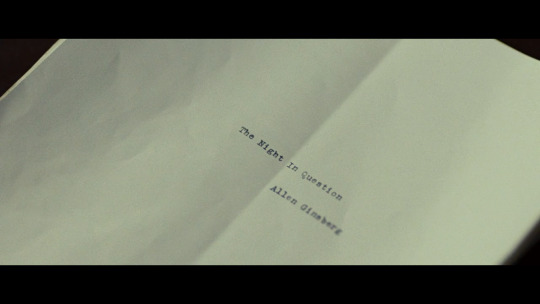
The Night In Question- why the movie's recounting of the events is fictitious:
When faced with the prospect of writing the deposition for Lucian, Allen tried his best to gather information about the events that led to David's murder. However, it proved to be a difficult feat as Lucien himself would not speak much about it clearly. So he pieced together what he could from the bits of information he got. However, we see Lucian vehemently opposing the deposition written by Allen and claiming it to be false. After some thought, I find that I believe Lucian's claims. Most of the following arguments are rooted in the fact that Lucien's relationship with David was an abusive one, where David basically groomed Lucian and was a sexual predator. I suggest reading my post here to gain more insight about how the abuse affected him.
"You weren't there, you don't know what happened." These words right here- they're the words of a victim. Being subjected to a form of sexual abuse myself, I found these words hitting me like a brick ton. These are words coming from a pained soul that refuses to recount traumatic incidents. He's practically saying that the abuse was so bad he had to kill his abuser to be free from it.
Even after Allen saw first-hand what a total creep David could be, even after knowing the man had stalked Lucian across multiple cities, he had to ask Lucian why the latter killed David when he "could have run". This tells me he couldn't exactly relate to Lucian's situation and wasn't very keen on believing him. Although he displayed a moment of intimate affection, there's still a lingering feeling of yeah but he broke my heart inside him. After learning how Lucian drowned David, he even begins questioning if he should help him at all. At this point, Allen doesn't trust Lucian enough to actually care how accurate the story is. So he wrote what he could, what he felt right. But even he couldn't condemn his friend/first love to such a fate as prison, so eventually he submitted it as his final paper. In all honesty, I thought that turning it in was a brilliant move, and one which also further proved that the "once you loved him too" version was mostly fanciful fiction.
Throughout the movie, sequences have been played in reverse frames (and I found this so pleasing) and from the nitrogen-inhaling scene, we know that these sequences designated memories playing out in Allen's head or his subconscious creating dreamscapes. And here's the catch- the entire scene of Lucian taking a walk with David and eventually killing him began with frames played in reverse order. This gives the absolute proof that the movie's depiction of the events were fictitious.
Allen's P.O.V. of the events mainly relied on the argument that at some point, Lucian genuinely loved and needed David. This couldn't be further away from the truth. When you're 14 and and being groomed and coaxed by an older guy, a lot many things could feel like love because you haven't experienced them before; but in reality, it's never love, it just is another form of violence.
Themes running through the movie
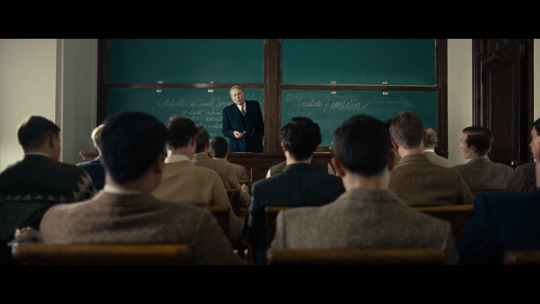
"There can be no Creation before Imitation"
We see Professor Steves saying this at the beginning of the movie, hinting that it would be a theme in the story. This statement is reflected throughout Allen's progression and development as a poet:
In the beginning, we see him being hugely influenced by his father's works and possibly trying to imitate him through poetic devices such as consonance.
Next, we see him imitating Professor Stevens' style of writing in his poem "the rose that scents the evening air, grows from by beloved's hair" which Lucian outright criticizes.
It is only with the poem Allen recites to Lucian on the boat that he starts developing some sort of originality. That poem in particular is directly drawn from his personal experiences and delivers splendidly.
This development continues as he proceeds to write "The Night In Question" wherein he brilliantly describes his opinion of how things went down. It was this streak that would eventually propel him to write his most celebrated poem, "Howl".
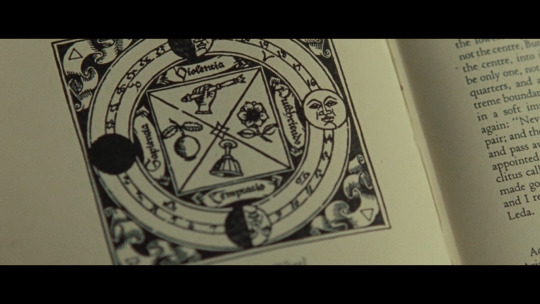
The Circle of Life and How Allen Breaks it
We see Lucian telling Allen how "Life is only interesting if it is wide" and about Yeats' "Circle of Life". As displayed by the linked document, turns out the circle of life is quite complex a thing, and the movie displays a lay-man's version of it. As Lucian tells about it to Allen, unbeknownst to them both, Allen also enters the circle and changes the turn of events:
It is obvious that at the party at David's, Allen was a misfit. David even goes so far as to literally call him out and point how unremarkable he was, but says how given the correct circumstances, even Allen could change things. And what's extraordinary is exactly this happens next: the liquor runs out in David's party and Allen suggests they should change the venue of the party- hence hijacking David's party!
We see Allen's life widen as he becomes closer to Lucian and starts doing things he'd never done before. At the same time, he also plays an important role in changing Lucian's life as well. It's Allen who suggests at first that Lucian should break up with David and stop taking his help. Later in the movie, after learning about David's obsessive behaviour, it's again Allen that said "we should get rid of him". Again, here we see some foreshadowing. Allen could have worded it in any probable way, and yet he suggested getting rid of David which subtly implied killing him. I do believe that this happened to become a subliminal suggestion to Lucian and furthered his murderous intent.
Hence, although Lucian radically changes Allen's life, the latter does so too in unlikely and unexpected ways.
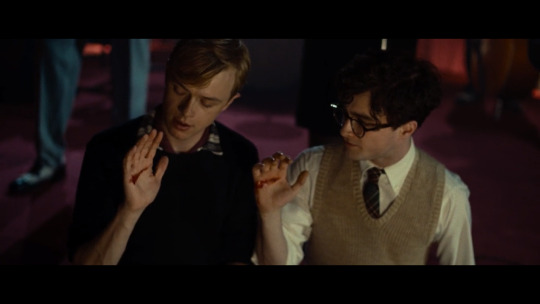
Sacrifices (and Rituals?)
Since the beginning of the movie, we know that the characters are all extraordinary men and that they are capable of something revolutionary. But it was apparent that all of them would need a catalyst to set things in motion- a sacrifice of some sort which would help them break their moulds and free their inner poet. Allen's love for Lucian and his wish to impress him did make him work toward become better at writing. It was the fear of completely losing Lucian to Jack that made Allen put all his effort into writing, and made him come up with his best work yet - here, the fear acted as the catalyst.
However, the most significant thing in connection to this happened in this scene where Lucian cuts both of their palms and holds them up together - this can be considered a Blood Ritual.
"A blood ritual is any ritual that involves the intentional release of blood. Blood rituals often involve a symbolic death and rebirth, as literal bodily birth involves bleeding. Basic to both animal and human sacrifice is the recognition of blood as the sacred life force in man and beast. The participants may regard the release of blood as producing energy useful as a sexual, healing, or mental stimulus. In other cases, blood is a primary component as the sacrifice, or material component for a spell."
The fact that this event took place inside Allen's head during a trippy session outlines how Allen had subconsciously taken a blood oath with Lucian to further The New Vision. This process of developing their revolutionary ideas would successfully progress for the rest of the movie; however, before its completion, the oath demanded a sacrifice- and the murder of David became this blood sacrifice.

"With Death comes Rebirth"
In the first half of the movie we see the initiation of this theme; after they've agreed upon to bring up something revolutionary, Allen talks about how rebirth comes only after death, and in their naivety, they play out a pseudo-suicide scene to imitate death. Little did they know greater sacrifices would have to be made. Eventually as events play out, we come to realise that it is David's death that became the cause and medium for their rebirth- both academic and intra-personal. Jack and Bill co-wrote the book "And the Hippos Were Boiled in Their Tanks" about the murder of David Kammerer, and eventually rose to fame, while Allen became popular with "Howl and Other Poems", none of which could have been initiated/inspired without David's death. As for their personal growth, none of them were the same as they were before the affair. I like to think all of them changed for the better. Lucian must have finally felt a sense of relief after getting rid of his abuser, while Allen finally took-off his rose-coloured glasses, saw Lucian under a more critical light, and developed a sense of self-esteem.
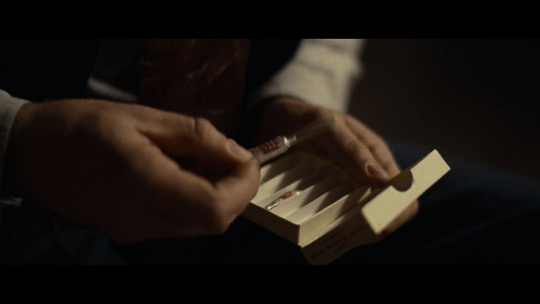
A Study in Violence
(I was unsure whether to include this point in this analysis or not due to the violent nature of it. But I figure this analysis would remain incomplete should I leave it out. So here it goes..)
The sequence from 1:10:00 to 1:12:00 was an in-depth survey of Violence and how it can occur in different forms. In particular, it focused on how any form of penetration is intimately violating.
We see a lonely Allen being so lost that he's about to have sex with a complete stranger. This itself is very unlike him, who in the beginning of the movie was shying away from Lucian kissing an unknown girl. A few sequences later we see how he wasn't very comfortable with this idea (he wanted to turn off the lights but the other guy turned them on) and yet he was made to shift into a position he did not prefer and hence was made to have rough sex.
We see Bill looking very solemn and injecting drugs into his hands.
We see the violent altercation between Lucian and David. We see David forcing himself on Lucian and eventually being stabbed by him.
We see Jack recieving the news of the death of his friend.
In this way, we see every member of the group being exposed to some form of violence, be it sex, drugs, physical altercations or death.
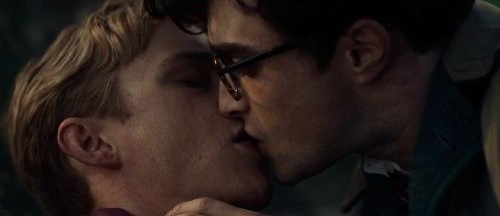
First Love and its aftermath
First love is also an important theme of the movie as it shows how one's first love has the capacity to radically change a person from within:
Allen's first love changed him from the shy, people-pleasing always-upright persona to the bold, radical, critical and unafraid person he became at the end of the movie.
Allen's discovery of his own style of writing can also be majorly attributed to Lucian's criticism of his rhyme-schemes.
All in all, it was his love for Lucian that drove him to become a more out-going person and ignited the mischief in his spirit, while the heartbreak of realising Lucian didn't feel the same for him also lent him invaluable insight and allowed him to develop confidence and a sense of self-esteem, which would play a significant role in him eventually becoming his own person.
While Allen's first love furnished him with the overall better things in life, the same could not be said for Lucian, sadly. Lucian's first love reminded us how oppressive love can become if the other person isn't suited-well for us; it showed us how sometimes love and obsession are separated by a thin line, and how dangerous it becomes when the line is crossed.
Lucian's story also showed us how sometimes a relationship can be more abuse than love, and when that happened, how easy it became to confuse violence with love.
The most significant message that the theme of first-love portrays is that there will always be consequences.
With this, I bring my arguments and analyses to a close. I hope a future (or even past) lover of the movie happens to stumble upon this someday and learn something fascinating about the movie (or reignite their love for it). Thank you for reading this far!
[P.S. an uplifting fact: in real life, Lucian, Allen, Jack and Bill each got the type of life they wished for, and remained friends for the rest of their lives :) ]
#kill your darlings#dark academia movies#daniel radcliffe#dane dehaan#movie critique#film analysis#I hope I could word this comprehensibly
67 notes
·
View notes
Text
We learned a lot about each of Jesus's followers from episode 3. A lot of what's been beautifully displayed/shown for us had a chance to be articulated and told to us here (in a natural way--great storytelling!). So let's break it down in a meta longer than what any of you asked for:
John - the themes explored in S2E1, which are very present in his gospel, are here again! He expresses awe at the fact that he--"a nobody"--is not only alive at the time of the Messiah, and not only sees Him, but travels with Him and is close with Him. That wonder at the personal, loving relationship we can have with God--that defines both John and his writings. But, we also see him give in to pride (setting up James to be better than the others, and his comment to "ask Matthew") and anger (accusing Simon, even if ostensibly in Matthew's defense, showed both anger and pride (a "you're no better than the rest of us!" mentality)).
Big James - we learn that he loves to study and has more theological/Torah knowledge than almost all of the group. He's a rule-follower, who loves the law and its structure (a foreshadowing of his eventual reluctance to accept Gentile converts who did not first convert to Judaism). More importantly, we see him acting as a moderating influence on the group. He comforts Mary when she expresses her insecurities about her past, and tries to get Simon to stop attacking Matthew. But, we also see how quickly he can become indignant and proud (telling Simon to sit down, instead of simply sitting down himself--"someone else must give in first, not me").
Simon - finally finally FINALLY we get to understand why exactly he's so mad and spiteful towards Matthew. He comes off as kind of a jerk half the time, but this moment (although heart-wrenching for Matthew's sake) helps to humanize Simon too. We get to see the roots of that protective, communal nature that will eventually make him such a good leader, and we see how deeply and passionately he cares for Israel. But we also see that he still struggles to accept those who are unlike him, and this will be a theme for the rest of his life, as he is called to minister to the Gentiles and told that all foods are clean. "Different" is something it takes Simon a long time to get used to. Additionally, his refusal to forgive Matthew is setting up his conversation with Jesus where he asks, "If my brother sins against me, how many times must I forgive him? Seven times?" (This was two-and-a-half times more than the required amount, so he probably thought he was going above and beyond.) I can just see Jesus knowing who Simon is thinking of and telling him, "No, you must forgive your brother seventy times seven times!"
Little James - we get to know a little about him! I just threw him on here since previously we haven't seen much of him and now we understand him a little more. We get to see him bond with Thomas, who's the first person we see really reach out to him, and we see his insecurity and his worry that Jesus will think less of him or change His mind about him. (What a relatable struggle!)
Thomas - what we learn about Thomas surprises us! We're told earlier that "being methodical is his thing" (S2E1), and he seems fairly shy at points, so we assume he must be like Matthew, or Philip. But he's not! He doesn't like the rules. He's somebody who questions things. (Shocker--he questions Jesus's resurrection too! Great set-up and character-building there.) He even says "I'd like to ask Him about that" (referencing Jesus losing His father, but showing that Thomas is someone who naturally asks and seeks). His innate drive to search out the truth is an asset, similar to Nathanael, but also similar is his hesitancy (and at times, flat refusal) to accept the truth because it seems hard to believe. It can also make him combative with those who have more faith, or more respect for the rules (there is some brief tension between him and Big James when discussing Torah, for example).
Mary - we learn that she is eager to learn the Scriptures, something that she as a woman was never allowed to do--and also that she feels she needs to relearn her Jewish-ness. She is ashamed of who she was before and felt that she turned her back on her true identity...sound similar to anyone?? It's no small wonder that she's sympathetic toward Matthew. Simon's outburst directly paralleled them (and Mary did not seem pleased that he used her past in that way). Mary feels that she has a lot to make up for, and has no expectations that Jesus will give her special honors or power--she is humble, and this is why she is more receptive to and understanding of His teaching, despite her lack of knowledge, than the other disciples are.
Ramah - she, too, is eager to learn; for her, this stems mostly from a feeling of never having been allowed to be anything but a dutiful daughter. Her worth was limited and defined by the men in her life. Now she is beginning to explore the possibilities of being defined by God instead, which is a distinctly counter-cultural move. This is why it's so important that she goes with Jesus despite her father's reluctance--she is showing she's willing to be someone other than who she's told to be. Instead, she'll be who she's called to be. But she is still insecure about her lack of knowledge and her inability to take initiative; she is more passive by nature, and even when recounting her imaginings of the Messiah, she doesn't imagine helping Him, just being rescued by Him. This sets her up as someone more able to be used by Him, as, like Mary, she has no delusions of grandeur, but she is still unsure of her role in the group.
Andrew - (this has been more "professional" so far but oh my gosh BABY boy I love him) we learn that he is considerate of others' needs and doesn't want to be a burden (through the "sorry" stories). He likes the rules and is comfortable in order, and things like apologies are meaningful to him because they show respect and consideration for the other person. This is why Andrew gets hung up on the fact that Matthew never apologized for his past and putting them in such a predicament--but John has a point when he stands up for Matthew. Although Andrew is doing it in a nicer way than Simon, both men are setting themselves up as someone who can forgive sin, ignoring the fact that Jesus has already forgiven Matthew (edit: what I mean by this is Simon is loudly excluding Matthew from the group because he's valuing his refusal to forgive over the grace Jesus extended Matthew. Andrew is nowhere near as extreme in this, and is justified in wanting an apology (naturally) but in jumping onto Simon's comments, he seems to indicate that he agrees with Simon's overall attitude--if you don't apologize, we won't accept you). It shows that despite his sensitive nature, Andrew is still proud, and feels that the respect he shows is also what he deserves. He will have to learn, throughout his time with Jesus, that the beauty of grace is that we don't get what we deserve. We are called to forgive those who persecute us, even if they don't ask for forgiveness.
And I'm sure I missed some (I can't even find the energy to cover Jesus's mother Mary, but I loved how they handled her as well) but even with just these we can see how the showrunners are taking such care to develop these characters in a way that their eventual interactions and growth in the later portions of the gospels make sense! They feel so genuinely real, and you can see in them the seeds of who they will become--seeds that Jesus had seen all along. Excellent, excellent work, and an even better witness to the transformative power of Christ!
#the chosen tv series#the chosen#it's so long that it took me like. a day and a half to finish this post#meta#my meta posts#quality meta seal of approval#not to hype my own post up i just put that on all meta posts so that i can find them#kay can i just catch my breath for a second#christianity#my christianity
73 notes
·
View notes
Text
Under Maintenance Review

(7.5/10)
Features:
-Portrait/character customization (female only)/The ability to disable your portrait
-Accessibility options (including OpenDyslexic and Atkinson Hyperlegible fonts, large text available, darkmode/lightmode options)
-POC protagonist (optional)
-Partial voice acting
TWs: Suggestive themes/content, Mentions of divorce, Minor psychological abuse, Strong language, Mentions of alcohol/alcohol use
Average route time: About an hour
Link: https://undermaintenancestudio.itch.io/under-maintenance
Under Maintenance by GameMaintenance (on Twitter) was a pleasant and unexpectedly delightful experience, featuring three (as of the latest update) loveable men to pursue! In 'Under Maintenance' we follow our heroine, whom you can minorly customize, bored and alone after her favorite otome game goes down for maintenance, leaving her to decide how to spend the rest of her night. You have a choice of either using the dating app directly or going straight to the bar (where you end up on 2/3 of the app routes anyhow.) Of the two options, the bar one is vastly more interesting, allowing for better, more interesting interactions and a slightly more organic set-up for each route. Either way you slice it, there are three options as of the latest build; Tristan, the unconfident and somewhat pathetic (yet oh so endearing) divorcee, Theo, the trustworthy, wonderfully easygoing and traditional mechanic, and Luca, the flirtatious bartender with a heart of gold and an incredible talent for piano.
Going off of visuals alone, I anticipated Tristan to be the nerdy option, perhaps a bookworm or gamer of some sort. The intro of the game hadn't set my expectations particularly high, having some hit-or-miss humor with the protagonist, and the references in Tristan's opening messages reminding me more of cringey roleplay than classic videogames (though I suppose I'm simply not old enough to understand the references.) Despite these hurdles, the route quickly picked up steam, and we were introduced to Tristan via an open mic night. As he rattled off his routine, I found myself having to pause every few moments to cringe, finding it strangely endearing and horribly cringeworthy at the same time, something relatively common throughout Tristan's route, and something his voice acting helps to sell remarkably well. He is established as an adorkable 'loser' of sorts, and goes on to be heckled, which you (luckily) are there to defend him from, allowing the two of you to finally spark up a conversation. Through a series of goofy misunderstandings and hijinks, he proves himself throughout the route as someone who's tragically unlucky and miserable, beaten down at every turn in his life, yet who still tries his hardest to impress and please you. Sadly, he doesn't get as much time for development as I'd like, remaining relatively meek and sad up until the ending, although he still manages to realize that it's not entirely too late for him, as the two of you move in together and Tristan begins to pursue college, moving the both of you toward a much brighter future.
Theo was the next route I pursued, and given that I had played the app prologue first, I was misled (purposefully) by his bio to believe that he would be the extremely flirtatious and pompous route. If one were to take the bar route, however, they would much more quickly see his true colors as a very down-to-earth and likeable guy. Either way, his friend sets the both of you up without either of you being any the wiser. The development from here is quick, a large amount of it happening offscreen with the two of you 'talking for hours' to get to know one another. Some inconsistencies in his introduction aside, Theo proves himself to be a very sweet, loving person, caring deeply for his family and the people around him to a near fault, tossing aside his own desires at times for this reason. Additionally, his route provides a good number of goofy moments, such as his dorky pick-up lines or his complete tech illiteracy, and his voice acting does wonders to sell the character as real and genuine. By his ending, he hadn't changed much personality-wise (though this isn't a problem, given that he didn't have many issues to start with in that department), simply becoming more tech-literate and fully committing himself to the protagonist, as well as giving a second chance to interest in learning to play the drums. His ending is rather satisfying, giving a sense of warmth, comfort, and closure for the couple, as everything seems to tie itself up in a neat little bow.
Luca was the route I was expecting the most from, as I had no idea what to expect based off of his app profile, having only his photo on the title screen to go off of. Regardless of which prologue you follow, you meet him at his bar, where he works as a bartender. As you get to know him, you find out that he's smart, charismatic, handsome, popular, talented with piano, family-oriented, good at teaching kids... and boring. On the whole, Luca has few downsides to his personality, taking everything in stride and never showing much vulnerability or interesting character development, his only notable and memorable personality flaw being that he has immense trouble pursuing what he wants outside of romantic contexts, as well as trouble turning people down. As the route progresses, nothing much changes with him, even as you learn more about his backstory considering his dreams of playing piano and how it contrasts with his desire to take care of his aging mother. Sadly, his writing, and at times stilted or awkward line delivery/direction, did little to help his character, feeling overall a bit cliche and lackluster despite having several charming moments as well. Upon reaching the end, nothing has really changed with Luca, with the protagonist having to be the one to step in and tell his mother that he needs to make his own decisions, ironically making it feel like the protagonist's decision, especially considering how this is what triggers his best ending. The both of you then move west to stay together as Luca finally decides to pursue his interest in piano, wrapping up in a decent enough manner with the both of you content with one another, pursuing your own respective passions.
Despite only having three official routes at the moment, there IS actually a very short, secret fourth route for a character I have yet to mention! Mark is a character who's been dealt a rough hand in life, your stock-standard smalltown bully, someone who probably peaked in high school, and yet he still manages to captivate my interest. He appears briefly on each route, heckling Tristan, insulting Theo, and being a general nuisance to Luca, with the protagonist telling him off each time. The only way to access his 'route'/ending is to go with him in chapter two of Theo's route, wherein he'll bring you two up to a make-out spot. He confesses, interestingly enough, that he hasn't been able to get you out of his head ever since you met at the bar, and whilst the two of you don't get much time to spend together after that, what brief time you DID have together managed to quickly and skillfully establish his character. His voice acting is also some of the best in the game, tying with Tristan for sheer believability and character established.
The Problems With Under Maintenance are plentiful, but easily fixable in most cases. One of the problems I noticed almost immediately was that the protagonist is unbearably horny and somewhat annoying. They spend the introduction/first date portion of every route trying to get into the respective guy's pants, something which I found a bit irritating and frustrating. Given how the game already has an abundance of choices, it would be nice to have some choices here to take things a little slower so that you could better immerse yourself in the character and routes depending on how quickly you wanted to try to take things. Of course, with most games, more agency and less obvious bad choices would also be appreciated, though this isn't entirely necessary.
Another problem I had was with how little development it felt like there was. The routes were somewhat short, though they still had a decent amount of content, but despite this the character change still felt underwhelming in places. This could easily be fleshed out with a few more events happening in each route, showing a slower, more fluid change, rather than the semi-abrupt shifts towards the endings. A few examples of this could include helping Tristan become more confident by supporting him and coming along to one of his improv club outings, listening to Luca play piano and giving him some critique over that, and either helping Theo babysit or listening to him play the drums and supporting him that way. This problem, however, is not nearly as egregious as it is in other visual novels I've played, and I still find the experience enjoyable, nonetheless.
As mentioned several times in the review, I'm not the biggest fan of Luca, and whilst this isn't a 'problem' per se, I figured I'd still share my feedback on him in this section. Luca is a man of many talents and positive character attributes, and despite a few cute moments regarding him joking about lactose intolerance or teasing the protagonist, he overall felt very flat when compared to the other two (technically three) options. His problems felt repetitive, and where we could've had a moment to admire his piano playing and how he takes time out of his day to teach kids, we were instead subjected to yet more anecdotes about his popularity with women, something that I felt was brought up a bit too frequently. Of course, I have no problems with a character being popular with women, but when it's brought up so often, it begins to feel like the character's only purpose is to be the stock-standard attractive, perfect man to swoon over. The issue of Luca feeling two-dimensional is not something that has an easy fix, or even necessarily NEEDS to be fixed (as it is just my opinion), instead being a wider issue with his overall writing and characterization. Luca, quite honestly, just doesn't feel like he has much agency in his own route. Even Tristan, someone who's chronically shy and socially awkward, feels as though he has more agency and willingness to do things than Luca, whereas Luca simply feels like things just happen to him or around him to further his story. You talk to his mother and convince her that Luca knows what he's doing and can make his own choices, you encourage him to follow his interest in piano out west, and whilst you also do somewhat similar things in the other two routes, those routes at least feel like the boys involved have their own lives going on, that things are actively changing and happening, whereas Luca feels as though, if you were to not interact with him, his life would remain stagnant. I feel as though this could be fixed if Luca were to simply make some more of his own decisions, and if there was less of a focus put on his popularity with women. Something as simple as him choosing to go west as his own idea and asking if you wanted to tag along would do wonders for his agency, or maybe even something like him having gained the confidence because of your encouragement to tell his mother himself that he knows what he's doing and can make his own decisions.
Praises for the game are SUPER easy to come by, and that's visible at just a glance of the title screen! As you complete routes, the boys' portraits light up, something I've always been a massive fan of. As well, the game's soundtrack is incredible and very fitting, perfectly setting the mood for each route. The characterization for MOST of the boys is also super consistent and enjoyable, and I can't help but find myself extremely excited for the eventual Mark route. Under Maintenance also features many adorable CGs that, incredibly enough, are super flexible according to however you design your protagonist, not shying away from keeping them in the frame, but instead completely changing the coloration to match whatever you'd chosen! Additionally, it's also nice that there's so many choices and endings, and so many ending cards as well, most of them having something funny, interesting, or satisying about them.
Overall, I'd happily recommend the game to someone with three or so hours open who enjoyed titles like Adopt-A-Boyfriend or Cryptid Coffeehouse!
#Boysenberry Bunny#vn review#Under maintenance#Under maintenance review#Under maintenance visual novel#Under maintenance vn#visual novel#visual novel review#romantic visual novel#review#critique#POC protagonist#Portrait toggle#lightmode#darkmode#atkinson hyperlegible font#Accessibility options#large text#openDyslexic#partial voice acting#Character customization#TWs#TW suggestive themes#TW suggestive content#TW divorce#TW strong language#TW alcohol#TW psychological abuse
4 notes
·
View notes
Text
THE SPONGEBOB SQUAREPANTS MOVIE: AN INVERSION ON “COMING OF AGE” FILMS AND A CRITICISM OF ADULTHOOD
Hi hello hey it’s me Jericho Jay “Japes” Marshall out here with a pretentious love letter to the filmmaking on display in nickelodeons The Spongebob Movie. Yes, I know it’s a kids movie. Yes, I know it’s not that deep. But I’m majoring in english, and deeply depressed, so I need to get this OUT and onto a PAGE.
I have watched this film many times over my lifetime, a few when i was just a kid, then in my early teens, even when i turned eighteen, and now, a month before i turn 20. Every time, I grow a new appreciation for the nuances that this movie brings to the table, and on my most recent watch my own deliverance from childhood makes me relate to the core themes the hardest I ever have. The Spongebob Movie isn’t just a movie about childhood, but a movie about adulthood.
Today, I’m going to make clear exactly how The Spongebob Squarepants Movie criticizes our understanding of adulthood and how society treats the neurodivergent, while effectively turning the “Coming of Age” genre on its head, within its 87 minute runtime.
START: CONSISTENT CHARACTERIZATION
One thing a lot of films (ESPECIALLY kids films) fail to nail is consistently showing aspects of a character throughout the runtime, enough that changes to a character feel impactful and justified instead of rushed and stifled. The best examples of movies that fail to do this are often the marvel movies that people tend to not remember- the first two thor movies, the avengers age of ultron, etc. In these movies, characters certainly have traits, but their personalities and motives can be very weak and make dramatic changes feel A LOT less dramatic. This can be seen in age of ultron, when quicksilver gave his own life to save someone else, which felt like nothing because he wasn't well developed. He wasn't particularly endearing, nor did him sacrificing his life contradict a part of his character. It felt very much like the writers trying to say "Look, this character which was once opposing the avengers, is now dying for one. Please cry." No hate to the writers of Age of Ultron, but it proves itself often to be an unmemorable part of the catalogue.
In the Spongebob Movie, the characterization is ON. POINT. After the introduction, with the pirates rushing in to watch spongebob, we get so much information regarding spongebob as a character.
Pictured: Spongebob holding a piece of cheese like an operator
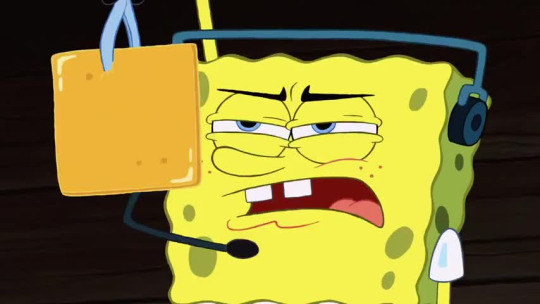
The first scene of the plot is a dream sequence a large crowded scene at the Krusty Krab, with a customer not receiving cheese on his patty, and it being positioned in the same way as a bomb being located. In the dream, everyone is panicked, and Mr. Krabs is visibly distressed, almost like a damsel. Spongebob comes in, announcing his position as manager, much to the relief of Krabs. He goes in, and puts cheese on the burger (again, very akin to a bomb defusal scene), bringing the perturbed customer out safe and sound. Everyone lifts spongebob up as a hero, which is interrupted by his boat alarm.
This scene is JAM PACKED with stuff that both introduces the character to new watchers and introduces the crux of his arc to everyone else. Spongebob of course is very fond of the Krusty Krab, and wants to be the manager- he wants people to see him as cool, and as a responsible adult. He wants to be the sort of person that can be trusted with big responsibilities. And we also see, most importantly, that he is extremely childish through his faximile of what it meant to be adult. Everything is scaled up; it's a very silly situation, which well suits both the joke and his character as an inexperienced kid. This is one of the most direct ways to convey someone's character, because a dream can be interpreted as a direct port into a character's desires. This being the first introduction to the character in the movie sets the tone for EVERY following situation.
In the next few scenes you see Spongebob's real life, which involves his lengthy morning routine; his life is sort of whimsical, and so too is his routine. He showers by shoving a hose into himself till he bursts with water, he uses toothpaste to clean his eyes but not his teeth, and he puts on pants which he must fold to make. Again, all pretty solid jokes, but also very telling about his outlook. He is funny, weird, and childish, which is juxtaposed by the scene where he's- he's uh- showering with squidward. Squidward is an example of the "adult" that spongebob isn't. This has always been the case, but here his normal routine makes it very clear that other people in this world aren't like spongebob. They shower normally, they brush their teeth, they put their clothes on like normal. Spongebob's world is one of wonder and without responsibility, which makes it questionable as to whether he could handle one.
Pictured: Spongebob's room, adorned with childhood imagery
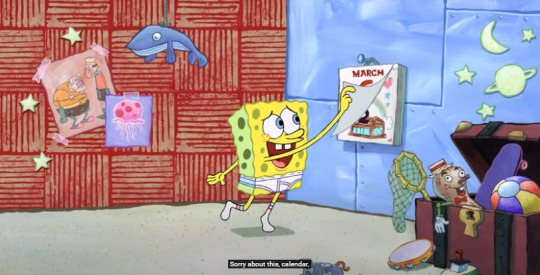
Pictured: Spongebob celebrating his position as a manager, despite Krabs saying that it was squidward who got it
Even his room in this scene screams "kid". He has toys strewn about, glow in the dark stars, and pictures of superheroes on the wall. He even says "Sorry about this calendar" as he rips a page, personifying inanimate objects as a kid would. The movie is telling you, "THIS CHARACTER IS A KID", but in a way that's masked because it's also just a set up for jokes. It's done so well, in my opinion, that it would go over your head because from your perspective you would be laughing along as spongebob did his wacky antics.
On top of that, his excitement for his assured managerial position at the Krusty Krab 2 continues to be bolstered. He marked it off with a cute drawing on his calendar, for those familiar he changes his normal "I'm ready" chant to "I'm ready- promotion-", and he's even already set up a party to celebrate at his favorite chain, Goofy Goobers, a child's entertainment restaurant similar to chucky cheese, albeit replacing pizza for ice cream. He hasn't just gotten excited, but has this childish anticipation for something which isn't even assured.

Spongebob arrives at the opening of the Krusty Krab 2, where he is so excited he can't contain his glee. He breaks the silence and makes members of the crowd uncomfortable, reinforcing again that spongebob is a standout in a world of adults, and a kid who doesn't understand certain social norms, which society looks down upon. When Krabs reveals that Squidward got the managerial position, Spongebob hyped himself so much that he starts celebrating, not even noticing that he wasn't picked. He gets on stage, and begins to give a speech, to which Krabs interrupts.
The next part I think best illustrates Spongebob's clear ignorance to society: Krabs attempts to subtly tell spongebob that he isn't getting the job, but spongebob repeats everything he says into the microphone. Again, fantastic joke, grade A, but the amount this shows how invested spongebob was. He already saw himself as an adult, someone who everyone would look up to as a manager- he could take the responsibility, and isn't aware of everyone likely cringing in the audience. This is the natural step for him in his mind, especially because of his exemplary work which had been previously celebrated through employee of the month awards. This was not an option for him. There wasn't a world in his mind where he would be outclassed by squidward.
Krabs has to break to him that he lacks responsibility, and that his childishness makes it difficult for Krabs to give him such a job. This might seem harsh, but I think the intro again shows how Spongebob saw the job; he didn't understand what it would be like, fantasizing another level in the menial work structure to be an amazing adventure of a job. People in the crowd reaffirm that in the eyes of society, spongebob is just a kid, a goofball. In my eyes, this is a story not just of childhood, but of neurodivergence. Spongebob isn't normal, and is blocked by society for his ignorance of social norms and sunny disposition. He finds things fun that other people can not, and he places values in completely different things. So he is blocked from the meaningful recognition he desired, despite the obvious evidence of his commitment.
I think this is a mighty interesting dichotomy!!! Simultaneously, spongebob's understanding of the world truly is warped, often resulting in a lack of consideration for others as well as harm for himself when things don't go his way, AND he is a good worker which puts in MANY hours of work without so much of a complaint. This is COMPLEX. You have to ask yourself, as a viewer, "would I give spongebob the job?" The answer can be different and can be REASONED.
And that's JUST spongebob! There are other characters with characterization that mixes into the themes of the movie very well, but I'm going to bring up any related points in future sections.
Okay, Okay. So now you're saying "WOW OKAY GREAT so why does any of this matter?" I'm so glad you asked. VERY glad.
2: THE BREAKING OF A YOUNG MAN'S SPIRIT
THIS is the point of the movie. The obstacle in this movie truly isn't adulthood, but instead self doubt. Spongebob's whole world is turned upside down by Krab's rejection of his basic personality. Spongebob asks himself: is it REALLY okay to be who I am? Am I an adult? Is the world fair? One of the most shocking scenes in the movie is blended so well in tone with the rest that you don't really notice; spongebob eating ice cream to cope with his disappointment, akin to that of adults drinking alcohol, and appearing to be visually "drunk" and washed up. This is BRILLIANT, and a recurring theme, where the true line between adult and childhood becomes blurry and impossible to see. Spongebob, the representation of a kid, gets hungover, spiteful, and angry about the injustice of his situation. This is often how adults act in the fact of adversity, but what's funny is that this too is how a kid would act; getting angry and overindulging, feeling entitled and acting socially immature when he didn't get what he wanted. He walks in to the Krusty Krab literally just to shit talk Krabs. And it doesn't stop there.
Pictured: Plankton finding "Plan Z" and looking at it like a centerfold in a playboy magazine
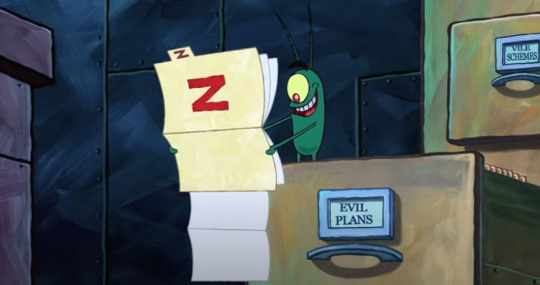
Almost every character in this movie juxtaposes another, again smearing the line of what it means to be an adult. For example, Spongebob and Plankton are polar opposites; plankton is cold and vengeful, angry at the world around him, and spongebob is a happy person who tends not to take things personally, a friend to all. In planktons first appearances in the movie, he is portrayed with clear adult themes, mocking spongebob, making pinup jokes about plan z, and living in a fairly dark and grey space. But, as the story moves along, we see many similarities; both spongebob and plankton are fairly one track minded, and when spongebob's perception is broken he himself gets a little vengeful. When eugene is put in danger over this, though, we do see that he places the lives of others over his own wants. And, even at the end of the movie, we see their similarities. Plankton reuses the "Sorry Calendar" joke that spongebob used at the start of the movie, drawing another line of what it means to be an adult. Is it childish of plankton to say that? Is the inherent irony he has impactful here? His want for something that isn't his, and his disregard for others in pursuing it feels just like how a younger child may steal the toy of another, without understanding what it means to share.
Pictured: Neptune flipping his shit at his lost crown
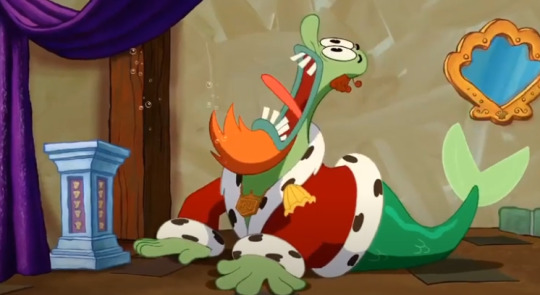
Then, there's the character of Neptune. Neptune is a big man baby. He rules the entire land, commands the most respect, and is considered the most powerful person under the sea, and yet, we see that he gets overprotective of his property, prepared to execute anyone who even annoys him. Throughout the film, he's obsessed with chasing an image of youth, as he is bald, and ignores the suffering of the people on bikini bottom to make sure no one sees his bald head. He throws what's equivalent to a tantrum when he finds his crown is missing, and believes a very crude note written by plankton saying that it was eugene who stole it. His character is an "acceptable" child because he's in a position of power, where spongebob is an "unacceptable" child as he is just a working class member of society. And the funniest part is, that he mocks spongebob for wanting to go for the crown, when even he, the strongest person in bikini bottom, refuses to go out of fear.
We see that these "bastions" of adulthood, plankton and neptune, are the ones who are responsible for missteps of society; we're ALL children in the long run, but the strict enforcement of a perceived true adulthood creates a space where they can act immaturely yet those under them/around them cannot. Dennis makes this case even more, as the only thing he does in this movie is hurt others. There's only one thing that seems to truly denote adulthood, and it's cruelty.
Even squidward, the adult that is supposed to be more responsible that spongebob, refuses to go on the quest to retrieve the crown, as he acts mostly in self interest, even later claiming to only care that plankton was stealing the secret formula as it was hurting his own paycheck.
Spongebob is the only one willing to go, willing to defend the man who wronged him, willing to value life over his own interests. He is both child and adult, just as the adults are too children.
As he moves through the plot of this film, he becomes less confident in his disposition, with his naivete causing moments like him and patrick crossing the state line and immediately getting carjacked, or them being put into an uncomfortable situation by all the bubbles they blew when they tried to get their car back. His bright personality is questioned constantly: Only five days to shell city? BY CAR. This is man's country. But weren't we the double bubble blowing babies?
Pictured: Spongebob caught trying to take back the key to the patty wagon when patrick fails to distract everyone
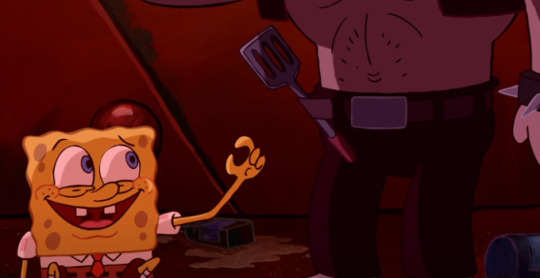
This is made more obvious to him as patrick remains oblivious throughout; patrick is a mirror for him, that acts as a childhood constant, that makes it clearer for him every day the draws of his childishness. There's the moment in the club where patrick's distraction was poorly thought out, and only because he said he wanted to do it adamantly, there's the moment where patrick challenged neptune on how many days they would have to do it, which served no purpose but for his own fun, there's the moment patrick points out the free ice cream trap- he is the unemployed uncritical lens that spongebob is afraid he is.
So everything's fucked, and anyone who is childish is bad i guess!!!
But that isn't so,
3: The illusion of manhood
So we've talked about spongebob's characterization as a naive child, how this is impactful in his transformation into someone who is anxious about that aspect of his personality, and how the society around him is hypocritical in it's own immaturity. But where does this all come together?
Pictured: Planktons dystopian world, which Mindy shows Spongebob and Patrick
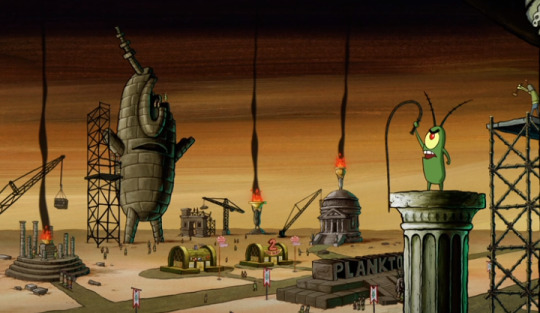
It's at spongebob and patricks "conversion to manhood". At his lowest point, spongebob becomes a squidward- he becomes critical of his AND patricks interests, and regards them as childish, deciding that this means that they can't make it to shell city, as it requires them to be adults. When mindy shows them the dire situation back home, she hopes that spongebob's sunny personality and care for others would shine through, but instead he turns to what society has been telling him; it's impossible. He can't do it, he's just a little kid, and there is no point to any of this as he'll fail regardless.
Thinking about it like this, it truly is one of the darkest points in the entire series; spongebob just openly admitted that there was nothing he could do, that all of his friends were goners because he was effectively useless.
Mindy comes up with an idea; she'll trick spongebob and patrick into believing they're men; she convinces them of mermaid magic (their innocence allowing them to believe) and uses kelp to make them think they've matured into adults. Notice that physical modifiers being the only key to this "fake adulthood". With this, they jump off a cliff because they believe that with adulthood, they are invincible.
This is really telling about how the society they're in thinks of being an adult, and relays that to children. There's another level, a distinct separation between spongebob and adulthood, which seemed like the difference between a squire and a knight- being an adult means that you aren't weak anymore (as though he was weak in the first place), and thus you can do things you never thought before. Is it truly healthy that this is how a society tells kids that adulthood is like, for them to enter the world and feel a truly awful financial and literal hellscape waiting for them? uh, you can, you can decide that for yourself i think.
Nonetheless, they survive the fall, and conclude that they really are invincible, able to power through a ravine with their happy go lucky attitude, eventually befriending the monsters which were once trying to kill them. They weren't acting like adults, but the labels themselves made it possible for them to soldier on with the childlike disposition they had. I find that to be powerful. If we were able to be more hopeful as adults, and power through the worst things brightly, could we do great things? Idk but these depression meds sure do taste good nom nom
After crossing the ravine, spongebob and patrick meet dennis, and have their worldview crushed as it's revealed that they are actually still kids. Dennis being the "alpha male" that he is, is characterized by violence and a lack of morality. The pair are saved by a giant boot, which is the first of two humans in this movie. Spongebob and patrick are both taken by the man in the diver suit, as we fade to black, marking the end of their illusion of adulthood.
4: Back from the Edge (of death)
Spongebob and Patrick awaken in an antique shop, realizing that they were surrounded by fish that had been killed specifically for sale as tacky antiques. They are lifted out of their fishbowl, and put under a heatlamp, as their fate is sealed to become a member among those dead fish. In spongebob's final moments, he mourns his inability to be an adult, as well as to reach shell city; but before they both die, patrick points out that they truly did reach shell city, as the crown was within their reach.
This. This is a phenomenal scene. Why? Because of what it means for spongebob's arc.
Pictured: Spongebob and Patrick on their deathbeds, finding happiness

He sees the crown, and realizes that, unequivocally, that even if he didn't bring the crown back, he made it to shell city. Every person he met told him that he couldn't even do that. and he did it. He is a kid, yes, but he's a kid who went where not even NEPTUNE dared go. Everything people said about him, about how him being a kid stopped him from success, was suddenly shattered. He has been asking himself if it's okay that he is a kid, and he saw, unambiguously, that it is. He is allowed to be happy. He can enjoy things that other people don't. He can be naive. He can be himself, no matter what anyone says. And so can you. Great things can be done by people who are "childish", who are "naive", who are kind without expecting a return, all of it. YOU are okay. Your stims are okay, your comfort series are okay, your interest in tropes are okay, YOU'RE OKAY!!!!
with that, spongebob and patrick are dehydrated on the table, and ostensibly die, the kids that they are, shedding one final tear each, forming a heart beneath them.
...
Miraculously, the tear electrocutes that lamp at it's socket, causing smoke to rise and set off the sprinklers, rehydrating the pair, and bringing them back to life. The "Man in the Suit" attempts to capture them, seeing them about to lift Neptune's crown, but the rest of the dehydrated fish come back to life- squirting him with his own glue and beating him to the ground, as spongebob and patrick run out with the crown. David Hasselhoff offers them a ride back to Bikini Bottom, and the pair begin their ride back.
5: The confrontation of Adulthood and Childhood
Pictured: Dennis looking all lame and shit
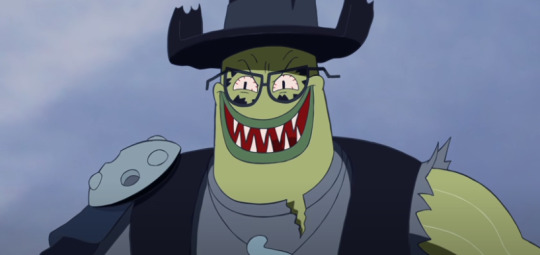
As spongebob and patrick are being swam back to bikini bottom, the boot under which dennis was crushed rockets to Hasselhoff, spitting him back out to finish the job. The appearance of Dennis, IN MY OPINION, makes him look rather goofy, with his broken glasses making him look more like a office worker than a badass assassin as he attempts to kill spongebob and patrick. Spongebob, in trying to reason with him, is able to ruin his eyes with bubbles, and then survives as dennis gets hit by a raised platform which spongebob and patrick are too low to be hit by.
Having defeated one representation of adulthood, spongebob and patrick are shot down by HasselHoffs MASSIVE MAN TITS with the crown in order to prevent Krab's fate, blocking Neptune's lazer just in time as they crash in.
All seems to be well, but plankton uses one of his mind control helmets (which we'll be getting into later) to enslave even Neptune, putting mindy, spongebob, patrick, and Krabs against the wall.
In another stark moment of characterization, Spongebob tells patrick that "Plankton Cheated", which prompts plankton to tell spongebob that the situation wasn't a kiddy game, and that it was the real world. This sort of distinctions in their ethos tell you how spongebob interacts with justice; he believes in "playing fair", while plankton is bitter and believes in getting what he wants.
Finally, the apex to our plot, is a musical number. Spongebob begins to make a long-winded speech, where he takes ownership of every label he was called as he stood on the stage at the beginning, the similarity between the two events being clear (holding a microphone at an inappropriate time, making a speech as he blocks out input from an adult trying to talk him down). Spongebob then busts out into the film's rendition of Twisted Sister's "I Wanna Rock", "I'm a Goofy Goober". This results in spongebob reversing plankton's whole plot with "the power of rock and roll". Plankton is made powerless, and thrown into a little padded cell.
The final scene in the movie has Mr. Krabs freed from his imprisonment in ice, and spongebob is offered squidwards position as manager of the second Krusty Krab. He seems hesitant, and squidward offers an insightful analysis of what spongebob might be feeling (the typical analysis of a coming of age movie, where the protagonist finds out that what they wanted all along is not what they wanted, but it was what was inside all along). Spongebob refutes that squidwards fly was just down, and GLADLY accepts the job.
AND THAT'S THE MOVIE
6: AN INVERSION ON THE COMING OF AGE GENRE
A coming of age story tends to be one which is focus on the growth of a character from childhood to adulthood, asking questions about what it means to be an adult. A character reaches for their perceived adulthood, and realizes what it means to ACTUALLY be an adult, typically juxtaposing what people think (drugs, parties, sex) versus what the movie postures as the correct adulthood (responsibility). In this, I think that the spongebob movie directly criticizes the position of what "an adult" is, in the sense of how someone acts.
Like we discussed in part 2, every adult character in this movie tends to be very childish in themselves, unable to see through simple ruses, and often very possessive of personal property. I don't think we actually see a child in this movie as a speaker at any point, only really as background characters (in goofy goobers to solidify spongebob as childish, and I believe in the chum bucket as they're lead to an unsafe place by their parents, who are supposed to be responsible). Thus, what is mostly examined is how adulthood and childhood is a very thin line. Squidward, for example, going directly to plankton to accuse him of stealing the formula, instead of taking it to the top immediately, which would have ended this whole thing fairly quickly; that was rather silly, and was the fruit of his need to assert himself as an adult.
Spongebob goes through this movie FIRST not caring much about whether or not he was an adult, and it is only after the social pressure from adults does he start to chase it. He then chases his perceived image of an adult, going on an adventure, and is crushed by the fact that he isn't an adult. Instead of finding what an adult is, he instead becomes comfortable with his existence as a child, finding himself at the end of the movie able to comfortably chase after an ideal again, where in a normal movie he would humbly reject the job he was offered.
This is, truly, what we should all take from this film. Spongebob realizes that people who aren't necessarily socially adjusted or acceptable can do great things, regardless of what the people around them say, especially because the people around them are liable to throw tantrums and be actively harmful to society. He is allowed to find comfort in childish things, and to be naive, because the world needs more people willing to help others. It's a scathing criticism on the imposed adulthood that exists in a lot of coming of age films, which begs us to drop fun in the interest of doing the right thing, as though those two ideas are contradictory.
BONUS: EXTRA STUFF THAT I LIKED
The goofy goober song became really good storytelling, at first marking childishness, then marking a level of discomfort and judgement in the club, then marking spongebob recognizing that his happiness came from what he liked and not some vague idea of adulthood, and finally marking his full acceptance of his childishness, taking the form of rock, the music of rebellion. It's not as subtle as leitmotifs, but it works really well in how the same song can give very different feelings throughout, and inform how we interact with a story.
There are a lot more examples of adults being pressured into childishness, with the connected twins who liked goofy goober at the club, who were beaten senseless for absolutely no reason, which highlights the way that the society hurts people that, by all means, are just as much adults as anyone else. There's of course Plankton's helmets which created a society of people who simply slaved away with nothing to say, taking life as it came and listening to authority.
On top of that, this movie is PRETTY ANTICAPITALIST AND ANTIMONARCHY, despite those things being allowed to continue to exist at the end- monarchy is seen misusing power constantly and often for unfounded reasons, and Spongebob's diligence at work is rejected by a penny pinching Krabs, who cares only about money. Like, THE KRUSTY KRABS ARE RIGHT NEXT TO EACH OTHER? THAT IS SOME MONTY PYTHON ASS SHIT. This year is the first year i laughed at that joke, because it's really some "capitalists are fucking dumb as shit" humor that slipped over my head when i was a kid. The villain literally being defeated by Rock and Roll, which was sung with a message against the oppression of differences in people? Yeah, I think the spongebob movie hated rich mother fuckers.
END: UH YEAH THAT'S WHAT IT IS
So yeah. The movie is good I think. There's a lot more i could go into, but I've been writing this post for hours and at this point i haven't even read it so...
I recommend going back and giving this film a rewatch!!! Pay attention to all the moments where adults act like children/kids act like adults, because it'll make ur brain pop like a zit. Anyways that's me, I'm Jericho Jay "Japes" Marshall, and I HATE facism.
27 notes
·
View notes
Text
Twelve-million more reasons Historia and Levi are part of the Endgame. With Pictures.
You can read the first post I made on this here:
10 reasons it would make narrative sense for Levi and Historia’s character arcs to end together.
(This is the mega-evolved version.)
Okay, I’m going to put this out there now, and before you judge me, please just read the posts. You don’t have to agree. This is just an idea. But it makes a stupid amount of sense, at least to me. So here's your fair warning (and now I'm being bold): If you don’t want to potentially be spoiled, Do Not Read On.
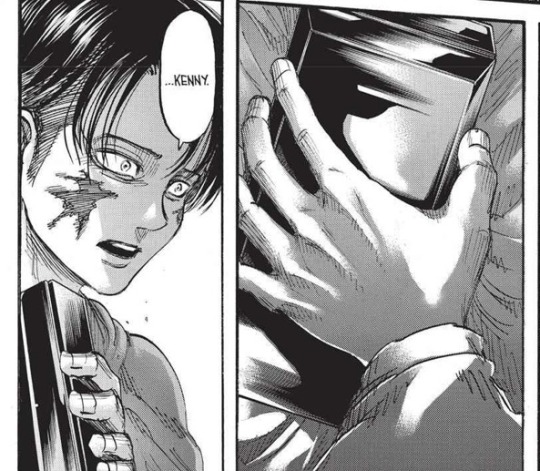
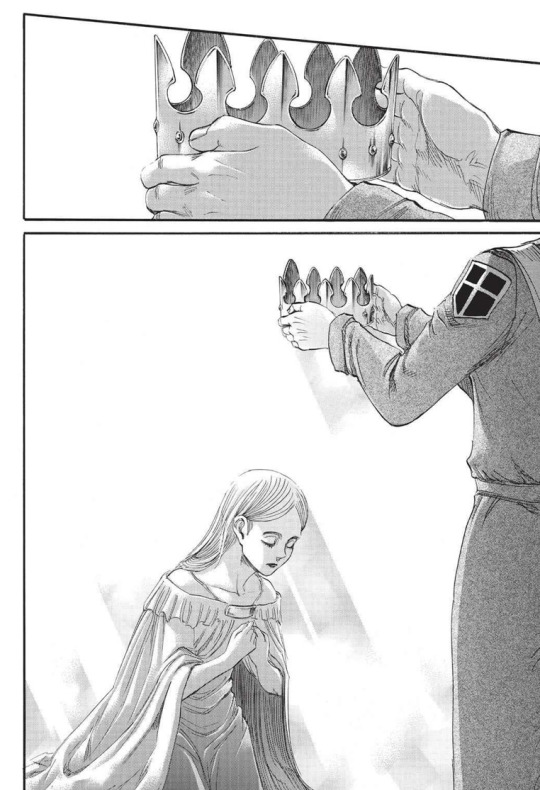
Here’s the Theory:
Historia Reiss will give birth to a half-Ackerman child, and together with Levi, from the ashes and ruins of the world Eren destroyed, they will welcome the dawn of a new age for humanity, where Ymir’s curse and the power of the Titans is extinct.
I know. I sound like some crazy, Rivahisu nut. Granted, I am, but I’m not mad enough to make a claim like this without a shit-ton of evidence, because it’s such a damn twist it feels like it can’t be true. But just humour me.
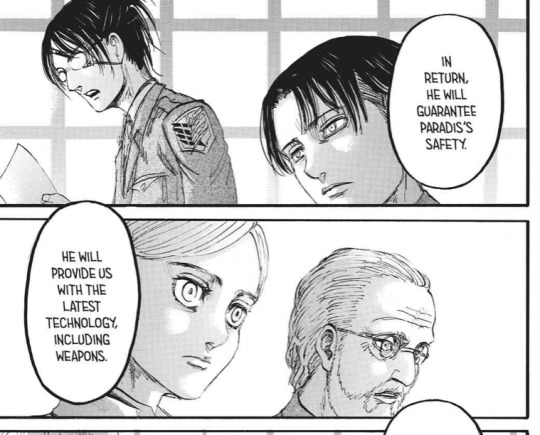
Here’s the theory, then we’ll look at why it makes sense and how it might have been foreshadowed. Please note: I have less clue how this will tie in to Eremika endgame, so I haven’t mentioned this as much, but obviously that will be the other very important side of this coin.
10 months ago (In Japan, full term pregnancy is counted as 10 months), at the banquet celebrating completion of the new railroad, Levi and Historia, having had 3 and a bit years to bond over their shared experiences and become close, may have gotten carried away together and shared one night of being a bit more than friends. She’s well into her 18th year at this point, just to clear that up. This resulted in Historia getting pregnant. Okay just stay with me; I know. I know. I sound crazy. But hear me out. So this pregnancy, contrary to the belief of the MPs and rest of the damn world, was the complete opposite of planned. Historia tells Levi, and Levi immediately panics. Because, to steal Kenny’s famous line, Levi thinks to himself ‘I can’t be some kid’s dad.’
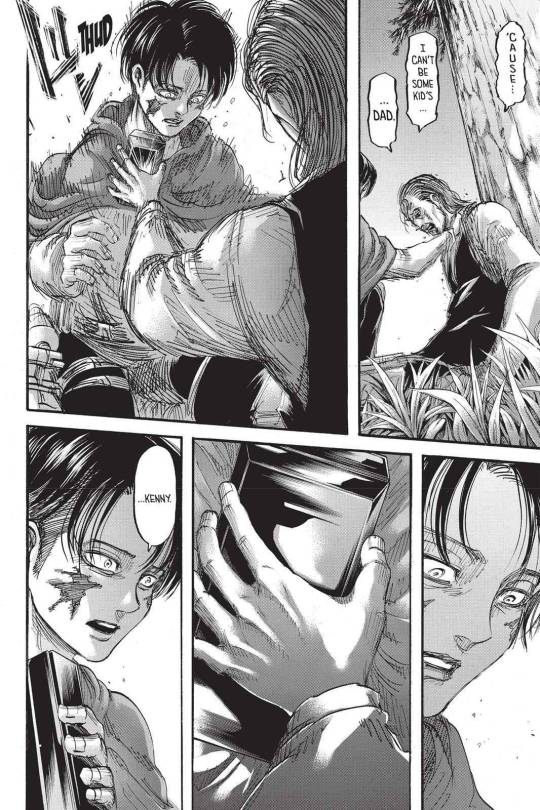
Levi does what he always does best, and shuts down into business mode, telling Historia she will need to cover it up somehow. Historia does as he asks, probably reluctantly, because she really has developed very deep feelings for him during the timeskip, and finds some farm hand to take the blame, likely saying she made a silly mistake with some random and the father doesn’t want anything to do with the child, and so she needs a father for the child not to be illegitimate. Which is her worst nightmare, because of course, that’s what she was. Levi watches the exchange hidden in that famous hood, feeling very conflicted, because although he cares about her, he thinks it best if no one knows that it was him that got the Queen pregnant, and of course, he’s duty bound, with a vow to fulfil, so he has no time to be worrying about a family. (Silly Levi!)
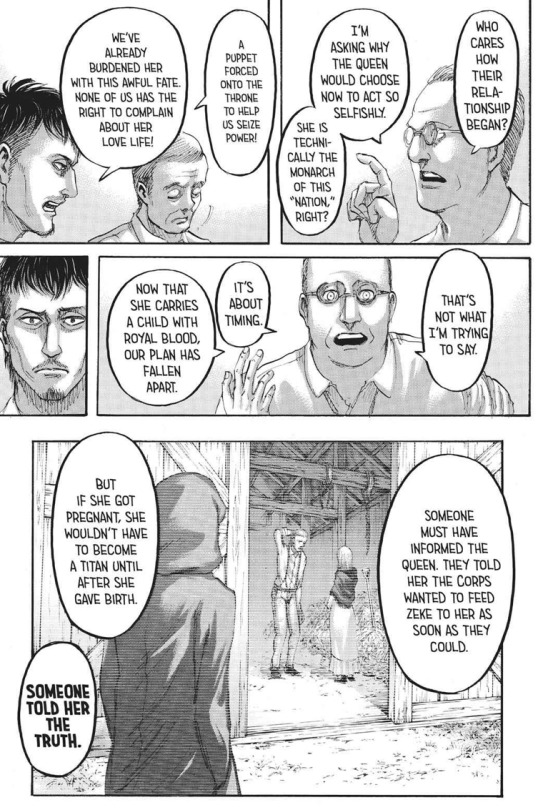
How ironic this conversation would be if this theory were true. Remember, Historia was completely willing to eat Zeke if needed. Instead, she got pregnant, unplanned, nothing to do with any plot or selfish wishes, just the result of a spontaneous act of love by two people who’ve grown to care for one another a lot. ANYWAY.
Because we know Levi actually has a good heart, he feels immensely guilty for all of this; he's just a product of his upbringing and thinks he doesn’t know the first thing about families, so it's better for all involved if he not be. See where this is going? The old cursed history repeating? Making the same mistakes as our parents? Plus, Levi is bound by his duty. He is incredibly important to the military still, and he cannot just abandon this for any of his own selfish wishes. He’s supposed to be the one to vanquish the beast titan.
Cue ten months of Historia looking hella depressed and hopeless, and Levi being even more of an asshole than usual to everyone, and not really wanting to say too much at all, as well as making some terrible workplace decisions (lol) poor boy be distracted.
Look at his face 😭
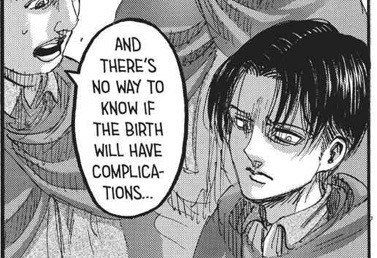
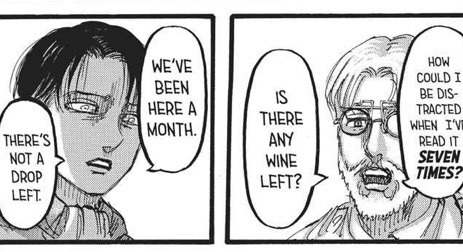
Yes Levi. A month. Which means Historia is now due and you’re still stuck with beardy, without a solution and pretty soon no reason for the MPs not to turn the mother of your child into a Titan.
That’s what that face is. I thought he looked a bit weird first time I read these panels 🤔 He didn’t know about the wine. We see that later. Anyway, I keep getting distracted, stop. I’ll come back to this.
But fear not; Levi will have a choice to make.
So this is where it gets a bit more iffy for me, because I'm not sure how it would work, so this could be a way off, BUT. I believe it will come to light that the combination of Royal and Ackerman genes will somehow cancel out a person’s ability to turn into a titan and connection through paths, thus making them truly ‘free.’
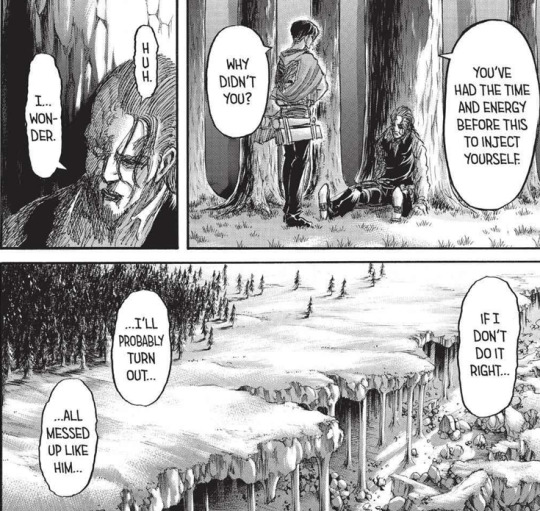
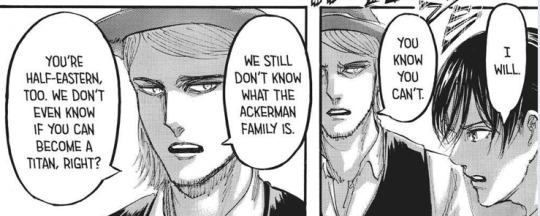
The founding titan has the ability to change Eldian physiology, according to what Zeke learned from professor Xavier.
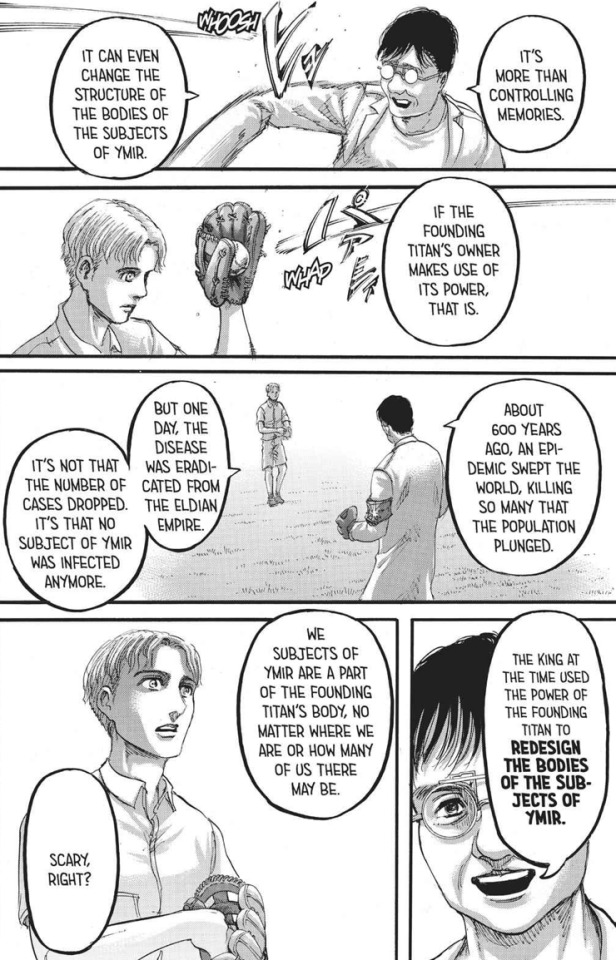
EDIT: Okay so here’s where I’ve had to tweak this a bit in light of there latest chapter. So we just had Zeke in PATHS. With none other than our second resident genius, and as proclaimed by Eren, the saviour of humanity: Armin. What do our boys have a conversation about? Reproduction and the importance of the small moments in life - it’s these little moments which matter, regardless of the desire or need to recreate. Interesting how both the leaf and baseball link back to what their ideas of ‘family’ became. If Historia and Levi were to be in the same scenario in PATHS, what would their items be? What truly means family to them both?
Perhaps Armin and Zeke realise what is needed to lift the curse of the titans - maybe a blueprint for genes which can cancel out the connection to PATHS and the founder? If only they had a child with a new type of Royal-Ackerman DNA which might fit the bill ...
Here’s Levi’s moment. He, with Historia, has created such a child - completely by accident, because of one of those ‘moments’ that both Armin and Zeke mention - moments that are simply just about enjoying what you have with no sense of how it might relate to anything bigger - a real rarity for both of them, considering their roles and constantly being asked to think about the good of humanity as a whole. What a beautiful irony, that in the moment they chose to be selfish and, to use freckled Ymir’s own words, really live for themselves, they set a chain reaction in motion that would ultimately save humanity.
Where does this leave Eren and Mikasa? Good question. I believe Eren will die once the curse is removed, because tragically he is the character that has been forced to choose humanity over his own personal relationships. As Isayama has said before, Eren is a victim of the story. Mikasa will be the last thing he sees, hence the original dream at the start of the manga, where he wakes up crying. Something like this. But probably a lot better. Yeah.
Out of the ashes of the old world, a new one will be built, but through Historia’s kindness and love, and Levi’s guilt and understanding of what was sacrificed in the past, society will not repeat the same mistakes. The final panel could be Jean holding his child, perhaps with Mikasa, if she ever manages to get over losing Eren. That would be vague enough so that Isayama was able to show it to us already without spoiling much. Or maybe Jean’s dead and it’s not him at all. I don’t know. 😭
Right. Okay. So now you’re going, sweet story, but uh, there’s no way Levi could be the father. He’s so much older. Isayama wouldn't write a moment of romance like that. Not with him and Historia. YOU’RE JUST CRAZY.
Well this is where it get’s interesting. LET ME SHOW YOU. It’s foreshadowed literally everywhere. Right under our noses.
There is so much symbolism.
Dedicate your heart to what? has been Levi’s question recently. What are they all fighting for? What is he fighting for? How will he give meaning to his dead comrades sacrifices? Is killing Zeke really the extent of it? Is vengeance the true meaning of their sacrifices? Or is it something a lot more hopeful?
The answer is shown to us in the opening credits. And the ending credits. Several times.
Levi says so himself - he keeps messing fulfilling the vow up - why? Why is he so worried about killing Zeke?
Eren has the same questions to consider. Which PATH is the right one to take - revenge and violence with the rumbling, or love ... with Mikasa. We are literally shown what their choices will be in two virtually identically designed panels, which I’ll show you. Tragically, Eren’s choice is taken from him. He is a victim to the story - he must chose the path that saves humanity. Levi and Eren have been bound together through the theme of choices, and taking the ones which leave you with the least regrets, throughout this entire manga.
The upcoming anime episodes literally plot out the timeline of Levi and Historia’s changing attitude to one another, and then Historia’s pregnancy, it’s just so cleverly subtle. Isayama even tells us when/ during what event her child was probably conceived by just dropping dates in from other, seemingly unrelated plot lines.
Zeke gives pointed comments to Levi constantly - every other line of his is either a different jab at Levi about Historia’s pregnancy, a veiled question, or a reminder that he’s under the pressure of a 10 month time limit to do something about him, or Historia will have to eat him once she’s given birth. We start to see Levi unravel because of this, and make mistakes over and over.
It’s in official art. It’s in the soundtrack. Its in music videos. There’s interviews from Isayama that, when read in light of these ideas, suddenly take on a whole new meaning.
Isayama even trolls us. He’s laughing in our faces, the madman. Like, gotchu 🤣 suckers. While we’re all on Reddit and Twitter like, ‘Levi’s character has become so stagnated! He’s making such poor choices or not giving anything to the plot at all. All that’s left for him now is to give up and die! Be at peace, your story is over.’ OOF. Or, ‘Historia has just been forgotten! She’s become such a pointless character. Isayama just got bored with her and sidelined her.’
I’m going to try and write stuff up in the rough categories below, but these might change. I’ll link them when I’m done, and then pin this post. I’m a bit of a rambler so heads up - this may take a while 😅
There’s also a ton of people I have to mention who have contributed to this - I didn’t spot it by myself. I’ll tag them in the finished post too.
Historia and Levi’s Miscalculation: A manga tale featuring the Jaeger Bros., Pt. 1
Historia and Levi’s Miscalculation: A manga tale featuring the Jaeger Bros., Pt. 2
Historia and Levi’s Miscalculation: A manga tale featuring the Jaeger Bros., Pt. 3
Ackerman-Royal Bloodline and Levi’s Choice Pt. 1
Levi’s Choice Pt. 2
Suns, Moons and Songs
Akatsuki No Requiem - Right theory, Wrong guy
The Farmer and The Cattle Farming Goddess, or WHAT’S IN A NAME.
Mistakes of our parents and breaking the cycle
Memories from the future & Levi’s Guilt
Watch this space. And hold on to your pants. If I’m right, I’m getting very drunk.
#shingeki no kyojin spoilers#shingeki no kyojin manga theory#historia pregnancy#snk#shingeki no kyojin#attack on titan#aot#levi ackerman#historia reiss#rivahisu
58 notes
·
View notes
Text
A Movie & More

Summary: Fic #2 for Theme Day One: Drive-in Movie
Part: 1/1
Pairing: Peter Parker x reader
Warnings: none?
Word count: 1,017
A/N: And that’s a wrap on day #1. Tune in tomorrow for Day 2! Enjoy.
~
All day Peter had been acting strange and you continued to share confused looks with your friends throughout every class. He had been avoiding you, and quite frankly you were kind of done with it at this point. The whole thing made you feel unwanted and the fact that it was Peter making you feel that way made the whole situation worse. You decided, after some bolstering from your friends, to confront him. So there you stood at the front entrance waiting, watching for that head of bouncy hair to appear. When he did, you struck. After cornering the guy you had planned to question him but began to lose your nerve, his face bringing out the hurt hiding in your eyes.
“Y/N? Are you alright?” He pulled you away from the flowing crowd of students making their way to the buses, a hand remaining on your shoulder until he noticed. “What’s wrong?”
“You’ve been avoiding me all day…” Your eyes are cast downward as he fumbles over his words in an attempt to verbalize an excuse. It hurt that he wasn’t being frank with you, that he was trying to pass off his behavior like it was nothing. “The truth Peter, you owe at least that much. I thought we were friends.”
“Oh no, I told them it was a stupid idea.” Peter may have mumbled the words but your ears were sharp enough to perceive them. Of course it was someone else’s idea, that explained part of it, you knew he was too kind to pull that sort of stunt.
“Who? What idea?” You took a step closer and stared him dead in the eye, arching a brow expectantly. His eyes widen in panic but you have no time for it, you need to know who told him to avoid you and why. “Peter, please.”
“It’s not important who said it, and I should have known playing hard to get was stupid.” He said the words so quickly your ears barely recognized them. “Sorry.”
“But if you were… then… oh come on Peter! There are a thousand ways to get me to notice you, but that is not one of them.” Peter nervously rubbed the back of his with a sheepish smile. “Besides, I already have.”
“Y-you have?” Peter chuckles, his eyes meeting yours with the tenderest gaze. “So, does that mean you’d want to go to the drive-in movie upstate this weekend?”
“I’d love to.” His smile wiped away the pain of the day and brought in a hope of more, a dream of something past this friendship.
You could not believe that you were in one of Tony Stark’s cars, one that practically drove itself. Possibly even did. But that wasn’t even the focal point of your thoughts, not even close. Peter sat in the backseat with you, the sun beginning to set and the pre show advertisement starting to roll, but his eyes were on you. He seemed to be looking at you pretty often, almost always tearing his gaze away the moment you met it. It was kind of adorable.
Your hand reached for the popcorn, eyes glued to the screen as one of the most famous scores in history began to play. Almost laughing when your hand met another in the bucket, you tore your gaze away. Peter froze. He was holding your hand and he had no idea what to do. This was much further than he had planned on getting, the evidence clear in his expression.
“I’m all for holding hands Parker but not buried in popcorn.” You laugh and pull your intertwined hands from the popcorn bucket.
The feeling of his hand in yours made your heart feel lighter, and seeing the soft smile on his face brought one to your own. He had been trying to make you pay attention all day, albeit in an idiotic fashion, but the thought still made your heart swell. Though misguided, the attempt was rather sweet. When the popcorn was empty you set it below leaning into Peter and resting your head on his shoulder. His head rested atop yours and you couldn’t help but smile as you snuggled closer.
Two movies later you were standing on the sidewalk outside your house, Peter leaning against the car door looking at a loss. The sight brought a smirk to your lips, his gentle expression reminding you why you had fallen for him in the first place. It had been two years since you moved to Queens and joined the group of science kids, befriending Ned and Peter almost immediately. The three of you had become inseparable. And Ned knew that you had developed a crush on his best friend, he was definitely your #1 fan. That’s when it hit you.
“It was Ned who told you to play hard to get.” It wasn’t a question, more like a blanket statement that both parties agreed upon.
“How did you-”
“Oh please.” You chuckle softly as you shake your head. “He thinks he knows how to romance a woman. But, between you and me, he’s taking all the wrong lessons from rom-coms.”
“You’re probably right. No, definitely. You are definitely right about that.” He had a soft smile as his eyes gazed up at the stars.
While he wasn’t looking you placed yourself beside him, leaning into the back of your hands, the door cool to the touch. He turned to face you and you leaned in to place a kiss to his lips, his arms wrapping around you as your lips moved in sync. You got that first kiss fluttering of butterflies, your heart seeming to soar. As the kiss deepened your arm snaked around his neck as one hand cupped his cheek. Your heart honestly felt on fire as you melted into his touch, parting only because oxygen was a cruel bastard. Peter didn’t remove his arms from you, still holding you close with his eyes no longer on the stars above.
Now this was definitely more than he had bargained for, but he wouldn’t change the night for anything.
~
Tags: @qtmeryr @broken-hearted-barnes @asphalt-cocktail @cantnkrusshedevil @gstran18
#marvel#peter#peter parker#peter x reader#peter parker x reader#spider-man#theme weekend#theme day one#requested#kayla answers
20 notes
·
View notes
Text
Kai
requests are encouraged! please read my guidelines before submitting your request
Genre: university!au, features Sehun and Chanyeol as the reader’s longtime friends & SHINee’s Taemin as Jongin’s best friend (bc i never stop being taemin trash lol). not really fluff or angst, but happy endings abound!
Word Count: 3,140
Note: this is an idea i’ve been developing for a while. it ended up being pretty long because it’s about one of my favorite themes: inaccurate reputations.this is an idea i explored in depth in my bts social media Any Other Name, which is referenced as a novel in this story. please enjoy!
As far as you could tell from your first month at your new university, there was only one rule: avoid the boy named Kai. Your roommate, a girl named Soo-ah, introduced you to an anonymous girls-only blog that meticulously detailed dramatic confrontations between other students. In short, it was a gossip website; however, instead of discussing the lives of celebrities, it was devoted entirely to exposing students. And the general consensus from the website and Soo-ah was that Kai was nothing short of a monster.
“Apparently, he likes to befriend girls before breaking their hearts,” Soo-ah told you, her eyes burning with rage.
“But broken hearts are kind of a part of dating,” you observed quietly. It seemed wrong to hate some guy you never met, regardless of how many anonymous people swore they were moved to tears by his behavior.
“Didn’t you read any of that stuff I told you?” Soo-ah held her phone out to you once more. “He only likes for girls like us to stroke his ego, then he’ll drop up like we’re worthless.”
“But how do you know? We don’t even know who any of these people are—” You set her phone down on the end of your bed when she refused to accept it. “And they don’t include his last name or even a picture, so how would we even know if we saw him?”
“You would know Kai if you saw him,” she answered vaguely. Eyeing you suspiciously, she snatched her phone off of your blanket. “And why are you so determined to believe he’s such a good guy? Do you know him or something? Has he already gotten to you?”
A furious blush rose to your cheeks at her accusation, and you shied against the wall at your back. “No, I don’t know him, and I’m not determined to believe anything about anybody. Would you feel better if I was afraid of every boy in the school named Kai?”
“Honestly?” Soo-ah glared, “Yeah.” And when your stare clearly indicated that you were uncomfortable, she smiled and added, “You know— just so you’re safe.”
. . .
When you recapped the conversation to Sehun the next day over lunch, he stared at you blankly. “You mean to tell me that the girls have a whole website where they post what they really think about guys?”
Rolling your eyes, you ripped a used page out of your notebook and threw it at him. “Focus, Sehun.”
“I am focused.” Sehun hurled the paper at your face, but you ducked. “We’ll talk about your weird roommate after you tell me if my name is anywhere on that blog.”
“I don’t know, I didn’t look for you.” You picked the balled paper off of the ground as you answered. “Besides, to be on there, I think you have to be some kind of affront to women.”
“Oh,” Sehun nodded. “Well, I’m a total gentleman.” Satisfied with your mocking laugh, Sehun said, “Anyway, are you sure that your roommate doesn’t have some kind of grudge against this Kai dude— or whatever his name is?”
You shrugged, “I have no idea— I literally just met her a week ago when I moved in.”
Sehun shook his head at you. “Seriously, Y/N, that girl could be a psychopath for all you know. I told you to just move in with me and Chanyeol—”
“Excuse me, I only finally escaped you two when you went off to college.” You teased, biting your cheek to avoid laughing. “You know, I didn’t even want to transfer here, but the scholarship—”
Sehun kicked you under the table. “Cut it out, punk. Chanyeol’s heart would break if he heard you.” He scolded as if he weren’t pouting himself.
“Fine, fine. Anyway, I didn’t tell you everything so you could analyze Soo-ah or convince me to move in. Is any of that stuff about Kai true?”
As he shrugged, Sehun wrinkled his eyebrows. “How would I know? I don’t know anyone named Kai.” Then, more gently, he advised, “But Y/N, maybe don’t take a risk on someone with a bad reputation, ya know?”
Your tongue clicked in frustration. “No— I don’t know, actually. I mean, what if I listened to everyone in high who said you were a bully because of your resting bitch face—”
“Don’t play with me, Y/N, I know you had a crush on me and my mean eyebrows—”
Groaning, you complained, “Okay, first of all, literally nothing is sacred with Chanyeol.” Once Sehun finished laughing, you continued, “Second of all, that was back when I was a freshman and you actually seemed cool.”
“All these excuses.” Sehun smirked as he leaned across the table to ruffle your hair. Leaning back, he abandoned his jokes, and said, “Seriously, though, don’t be too naive. I know we think Soo-ah is a weirdo, but maybe she has some history with that guy, and she’s trying to protect you.”
Again, you refused to accept Sehun’s opinion that you should just be cautious. “But she didn’t even tell me who he is. And the blog calls him Kai— like some nickname.”
“Or a codename,” Sehun suggested. “Look, I’ve been to a lot of parties—”
“Is this really the time to brag about your social life?”
“ — Shut up! Anyway, I know almost everyone here, and nobody in my grade is named Kai. So maybe it’s just like a fake name everyone on the blog knows someone as?”
Your brow furrowed as you tried to rub the headache out of your temples. “But why warn me if nobody is going to tell me who to fear? The more I think about it, the more I think this is just some clever way for people to gossip.”
“Yeah? Well, welcome to college.” Realizing how troubled you were, Sehun recommended, “Don’t pry if you think it’s just girls being catty. What’s the point of going through the effort of finding out who the hell Kai is if they’re just venting?”
“Because it’s not fair for him to have a bad reputation if he didn’t do anything wrong.” You were about to begin your rant anew when your phone buzzed, signalling an incoming text. “Sorry, I gotta meet someone in the library. Group projects are so inconvenient.
“Yeah, don’t lie to me about meeting other guys, Y/N, it confuses me about the true nature of your feelings.” It would have been impossible to know that Sehun was joking if you lacked the years of experience in noting the slight upward twitch of his lips. “You’re coming to the party tonight, right?”
You nodded, “Yeah, sure. I have nothing else to do.”
“Obviously.” Sehun laughed when you shoved his shoulder. “Go ahead and invite your boyfriend so Chanyeol and I can run him off.”
. . .
Jongin was the only person who made a good impression that first month of classes— well, aside from his friend Taemin. As far as you could tell, the had to be the most popular guys on campus, judging by the whispers and stares that followed them everywhere. What were the odds, you wondered, that two seemingly perfect people would be inseparable best friends?
It was surprising to find him waiting for you alone in the library, since it was your first time seeing him without Taemin.
“Hey.” Jongin greeted you with a warm smile, just as he had on the first day of class.
While people obviously initially admired him for his stunning appearance, Jongin’s personality was more worthy of appreciation. And you knew it was silly to be yet another girl whose heart raced for him, but you couldn’t help it.
You returned his smile as you sat. “Hey.”
“So,” he raised the assigned novel, “what did you think of the book?”
“Actually, that was, like, my thousandth time reading Any Other Name,” you admitted bashfully. “It was my favorite book in high school.”
Jongin’s jaw dropped. “No way! It’s my favorite book too!” His excited volume attracted several hisses from nearby students and the assistant librarian. While his cheeks turned scarlet, he flipped his book open and displayed the colorful annotations. “It’s a little embarrassing, but I did most of this before the book was even assigned for that contemporary literature class.”
Hours slipped away as you and Jongin discussed your favorite parts of the novel. By the time you finished the project, and took a few selfies, and made plans to watch Any Other Name’s film adaptation, the sun had set. A quick glance at your phone confirmed that you were running late for the party.
Sehun had only been joking about you inviting Jongin, but at this point you were confident that he enjoyed hanging out with you, and you weren’t ready for your heart to calm. “You know, I’m about to go to a party at my best friends’ place. You may know them— Sehun and Chanyeol?”
“Yeah,” Jongin nodded. “I know them.” He laughed as he rubbed at the back of his neck and admitted, “And I know their parties are a little wild.”
You dismissed his concerns by explaining, “They’ve been my best friends since high school, that’s the only reason I’m going.” You blushed as you realized that he was likely politely rejecting you. “Ah— actually, it’s okay if you don’t wanna go—”
“Wait, you’re inviting me to go with you?”
Had it not been obvious? Jongin smiled when you nodded. “Okay, Y/N, I’ll go, and I’ll look out for you.” And he took your hand in his and allowed you to lead him out of the library.
. . .
The party was a chaotic blur. Evidently, Sehun decided to invite everyone he knew, resulting in little space to move and booming volumes. While the environment prevented a continuation of your earlier conversation, it didn’t discourage Jongin from remaining at your side throughout the evening, acting as your date and protector from the boisterous guests.
Sehun nudged you as he passed you near the blaring stereo and teased, “I can’t believe you actually brought him.”
And Sehun wasn’t the only person suspended in disbelief. You would have to be blind to miss the stares, which you attributed to envy considering Jongin’s popularity. Until the following morning, after Jongin escorted you to your dorm, when Soo-ah shoved her phone into your hand again, you didn’t consider that Jongin’s reputation could be more sinister.
“I told you to stay away from him.’ Soo-ah reminded— as if you could ever forget— while you examined the pictures displayed on her phone. They depicted you and Jongin dancing at the party.
“This doesn’t make any sense— his name isn’t even Kai.”
Yet the caption clearly read: ‘Kai picks his newest prey. Don’t be naive!’ and linked to Jongin’s account, where he had posted the pictures of you from the library. So it was as Sehun suggested; Kai was an alias for Jongin.
It wasn’t that you trusted Soo-ah or distrusted Jongin— so why was there a sudden sharp ache in your chest? Why was your stomach suddenly in knots? You didn’t know him well enough to suffer a broken heart, so your discomfort had to be caused by the embarrassment of having your pictures spread among anonymous strangers.
All you knew for certain was that nothing could come from confiding your feelings in your roommate, so you returned her phone and resolved to remain silent.
. . .
You spent the weekend trying to interpret your feelings alone without much success. When Chanyeol collapsed into the desk next to you and stole a concerned glance, you finally realized how deeply confused and upset you were by the entire ordeal.
“Hey Y/N, what’s the matter?” To comfort you, Chanyeol dug a cereal bar out of his bag and tossed it onto your desk. “Something happen with that guy you brought to the party?”
And you should have known better than to recount the situation to Chanyeol in that ten minutes before class; Taemin sat in the back corner of the classroom, and anything he heard would be repeated to Jongin. However, at Chanyeol’s compassionate provocation, you explained everything.
Like Sehun, Chanyeol fixated on what you considered a minor detail. “You mean you’ve managed to find the only guy in the world who’s obsessed with your favorite book?”
“That’s what you picked up on?”
“It’s just— it sounds like you really like him. And it sounds like he really likes you. And you have the same interests. And it’s dumb that you’re letting some stupid gossip blog ruin everything.”
“I didn’t say I didn’t like him anymore.” You glanced over your shoulder to make sure Taemin wasn’t listening; and when you were satisfied that he was listening to music, you continued, “I’m just not sure I’m okay with people taking my picture and talking about me just because I hang out with some guy.”
“Well, Y/N,” Chanyeol studied your expression as he leaned back in his chair, “If you really like him and you don’t believe what your creepy roommate says about him, maybe just avoid that website.”
Before you could respond, the professor began his lecture.
Maybe Chanyeol was right. You could easily forget about the blog, since you only knew about it and read it when Soo-ah was forcing you to read it. But could you really ignore the real world scrutiny? Even as you took notes, you lost count of how many girls turned around to stare.
If this was how they were acting after a weekend of ignoring all of Jongin’s texts, how could you believe everything would go back to normal if you swore off involvement with him? And, perhaps more importantly, why should you live to please a bunch of strangers?
As an act of defiance when that girl in front of you glared at you once more, you yanked your phone out of your book bag to ask Jongin to meet you to lunch, and you didn’t try to hide your smile when he immediately replied.
After class, Chanyeol rubbed your arm on the way out. “Everything will be okay. And if your roommate doesn’t back off, you can always stay with me and Sehun.”
You only nodded before heading to the campus cafeteria. A few steps later, a delicate voice called your name.
“Y/N?” It was Taemin, approaching you with a gentle grin. “Um, no matter what anyone says, Jongin really likes you. Don’t tell him I told you, but he’s had a crush on you since the first day of school, and he had a lot of fun with you the other day. So maybe don’t believe everything you read online.”
“You mean—” Your voice dropped below a whisper as you were almost too nervous to ask, “You mean you know what everyone says about him?”
Taemin nodded before confessing, “Yeah, we know what everyone says about us. They’ve been talking forever. But please don’t believe it.”
As relieved as you were to learn that your instincts were right, you were more consumed by sympathy for Jongin and Taemin. Despite the growing guilt of ignoring Jongin because of unfair rumors, you smiled softly at Taemin. “Don’t worry. I don’t believe it.”
Bearing that in mind, an apology tumbled out of your mouth the moment you found Jongin waiting for you at a table by the window. He already bought both of your meals and set your food at the space opposite him.
“For what?” He smiled at you, evidently determined to believe that you hadn’t deliberately avoided him all weekend.
You sat down and began, “I’m sorry I heard rumors about you— I didn’t even know they were about you—”
Jongin took your hand in his to interrupt your rant. “Y/N, don’t worry about it. I know all about that Kai stuff. Honestly, when you were actually nice to me and invited me to that party, I guessed you just hadn’t heard anything.” A frown yanked at his lips as he concluded, “I knew it was just a matter of time before you heard that I’m apparently some kind of jerk and decided to distance yourself.”
You appeared to have forgotten how to speak until Jongin released your hand and stood to dismiss himself. “I didn’t believe them—” You blurted as you grabbed his hand and tugged him back toward the table. “I didn’t believe the rumors before I knew they were about you. Before I even liked you.”
He stilled and sank back into his seat. “Really?” He narrowed his eyes at you curiously.
“Really,” you repeated. “It was just an instinct. But if you don’t mind me asking, why do they call you Kai? And why are people so determined to talk about you?”
“They’ve just always talked about me.” Jongin shrugged; it must be a part of life he accepted long ago, but that acceptance didn’t lessen his frown. “I don’t know why they call me a womanizer; I’ve never even dated a girl. I remember when Taemin had his first girlfriend, the other girls were so mean to her; I didn’t want anyone to go through that because of me. I really hoped things would change when I got to college, but— well, I’ve been here for a full four years, and people still whisper behind my back.”
Then, rather stupidly, you asked, ���You still don’t date?” as if all you could think of was becoming Jongin’s first girlfriend.
Thankfully, he chuckled and you could release the anxious breath you were holding. “Nope. Until quite recently, I didn’t attract anyone I really liked. Actually— until this week, I didn’t attract anyone who actually liked me for more than my face.”
In a feeble attempt to distract from your deepening blush and an earnest effort to console Jongin, you said, “Well— for everyone who chose to believe rumors rather than get to know you, it’s their loss. Your kindness is way more impressive than your face, and you’re beautiful so that’s really saying something.”
Jongin caught his bottom lip with his teeth to keep from smiling, but the corners of his lips curved upward anyway. “Thank you. And to answer your other question, I went by Kai in high school. The girl who runs the blog, Soo-ah, ran it in high school too, and I guess she hasn’t stopped thinking of me as Kai even though I’ve been running from that name because of her.”
“Damn.” Your jaw clenched in anger as Jongin placed the final piece of the puzzle in your mind. “I hate when Sehun is right. My roommate is a psychopath.”
And, on a less infuriating but still annoying note, Sehun also accurately predicted that you would have to move in with him and Chanyeol— at least if you wanted to date Jongin without enduring daily rants from your deranged roommate.
#exo imagine#exo imagines#exo scenario#exo scenarios#exo fluff#exo angst#exo drabble#exo drabbles#exo oneshot#exo oneshots#exo one shot#exo one shots#jongin#jongin imagine#jongin imagines#jongin scenario#jongin scenarios#jongin fluff#jongin angst#jongin drabble#jongin drabbles#kpop imagine
110 notes
·
View notes
Text
Lesbians And Gays Of The Past #6: Book Review of Shadowdance by Robin Wayne Bailey

Favourite Quote:

While reading Shadowdance I wasn’t sure if I should post a review for it. Because my reviews are pretty much a recommendation. After finishing it though I truly believe this is a novel more people should read, but I will preface this by saying PLEASE read the trigger warning list I’ll have at the end. Because this novel deals with a lot of graphic and sensitive subject matters that maybe very triggering and disturbing to a lot of people. Also while I have you here I also want to say I’m unaware of what this authors sexuality is, but it is written by a man. So this might be an Own Voices story as well.But with that said please enjoy the review~!
This is the first gay male story I’m reviewing on here and I’m excited to share such a rich and magical story with you all. Shadowdance is set in the time of witches, curses and kings. It follows the story of Innowen (Innocent). As a young child he was abandoned on the side of the road because of his physical disabilities. There he was saved and rescued by a woodcutter of the name Drushen , who raises him as his own. One night Drushen falls ill and with no way to help him Innowen crawls along the old dirt road in hopes of finding someone who can save this guardian. Here he meets a powerful witch who ends up granting him the ability to walk again. But at a great cost. He is only able to walk at night while the rest of the world is asleep, and every night he must dance in order to appease the witch’s God and keep his ability to walk at night. But a terrible curse ends up befalling any who see him dance.
Innowen makes it his quest to find the witch once again and find out more of his past. This is where he meets Razkili (Rascal) who ends up befriending him and together they try to find the witch.
I think what struck me most about Shadowdance is the beautiful poetic language and almost fairy tale way of presenting its themes and characters. If any of you have read The Iliad it gave me very similar vibes to that. And the focus is never on Innowen’s sexuality. It’s not something he struggles with. It just is. Romance isn’t even the main point of this novel. It is about finding oneself and accepting yourself for who you are. Accepting your past and your lineage without letting it define you. It many ways it also reads as a Greek or Shakespearean play. There are many twists and turns that all come together to explore this tragedy and make sense of all the characters actions towards the end. It truly is one of those stories that only fully makes sense once you have finished it. The emotive imaginary and motifs throughout this novel are often breathtaking. The relationship between Innowen and Razkili is one of the most tender portrayals of a gay male relationship I have seen in a long time. You never get to see how they meet, you only get to hear about it. But you can feel their love and devotion to each other. Their love feels very equal and real. They help to carry each other through their short comings and shape each other into better men. Their love is very apparent from the beginning, however, their romantic love for each other is something that slowly builds throughout the story, like heated embers.
There is a female character in Shadowdance named Dyan who Innowen develops a semi relationship with, however, the way the author handles her is remarkable in my opinion and I was happy to see how it played out. She feels envy and jealousy for his relationship with Razkili but never once does she act poorly towards either of them. If anything she is one of the reasons the two are even able to be together. She isn’t “getting in the way” of the gay dynamics of the novel nor is she just there to spark tension. Both her and Innowen genuinely love and care about each other, and it was really beautiful to see.
Innowen’s sexuality is never stated, but just based on how he acts and what he has done I would think he is bisexual, which is also some nice rep there. The country they are in isn’t stated either, but it is most likely something akin to ancient Greece and from the way he described Razkili sounds like he would be a gay MOC.
I would recommend this book to anyone who enjoys dark fantasy, slow burn romance, Greek history and poetic writing. It is honestly a very moving and emotional read.
Trigger Warning: Graphic depictions of r*pe, sexual assault, consensual incest, insect via r*pe, graphic battle scenes, war, slight homophobia, sexism, graphic death scenes, HEAVY ableism
Spoilers: Has a HEA ending for the couple
#mlm#lgbtq books#gay moc#gay books#book review#lgbt#lesbians and gays of the past#shadowdance#Robin wayne bailey#personal
122 notes
·
View notes
Text
June 29th-July 5th, 2020 CTP Archive
The archive for the Comic Tea Party week long chat that occurred from June 29th, 2020 to July 5th, 2020. The chat focused on Without Moonlight by Tantz Aerine.

Featured Comment:

Chat:
Comic Tea Party
BOOK CLUB START!
Hello and welcome everyone to Comic Tea Party’s Book Club~! This week we’ll be focusing on Without Moonlight by Tantz Aerine~! (https://withoutmoonlightcomic.com/)
You are free to read and comment about the comic all week at your own pace until July 5th, so stop on by whenever it suits your schedule! Discussions are freeform, but we do offer discussion prompts in the pins for those who’d like to have them. Additionally, remember that while constructive criticism is allowed, our focus is to have fun and appreciate the comic! Whether you finish the comic or can only read a few pages, everyone is welcome to join and chat with us!
DISCUSSION PROMPTS – PART 1
1. What did you like about the beginning of the comic?
2. What has been your favorite moment in the comic (so far)?
3. Who is your favorite character?
4. Which characters do like seeing interact the most?
5. What is something you like about the art? If you have a favorite illustration, please share it!
6. What is a theme you like that the comic explores?
7. What do you like about the comic’s story or overall related content?
8. Overall, what do you think the comic’s strengths are?
Don’t feel inspired by the prompts? Feel free to discuss anything else that interested you!
snuffysam (Super Galaxy Knights)
I really like the flash forward aspect of the beginning - keeping the scene in the back of your mind really helps keep things tense as you see the story build towards the scene we see at the start.
(it also helps with the tone - it would be pretty jarring to go from kids stealing food from trucks to the scenes where bodies start dropping if we hadn't established that dark tone early on)
One thing I like about the comic is how the text colors switch based off languages - blue is greek, black is german, red is english, and i believe green is italian. Really makes the language switches easier to keep track of in the back of your head.
I like the comic's theme of... "your actions have consequences", essentially. There are dozens of moments where something bad happened because of one character's action or lack of action, and it's a matter of... when there are so many factors, who should be held responsible for these bad events?
RebelVampire
I like that the beginning of the comic is...more light-hearted despite the situation? I mean it's tragic and I don't mean to paint the situation lightly, but it's also kids and kids are like beacons of hope. So despite it all there were happy smiling faces. Before the chaos descended. My favorite moment in the comic so far was probably when Basil was rescuing Fotis and Wolff decides to let them go. It was a rare moment of humanity where there was no whose side is whose. Just two people doing a bro favor because neither thought a child deserved to be tortured. My favorite character is Basil. Basil really is just the down-to-earth dude he kind of finds that balance between doing what's right but with principle. And he also gets going when the going gets tough. And I'm sure nothing ever bad happened to him in this comic. My favorite characters interacting are probably Fotis and Martha right now. I like this dynamic that they're brought together by tragedy. So it's kind of interesting to see that bond, while also kind of experiencing this weird age gap where even though Fotis is much younger, he grew up almost instantly cause of tragedy. Something I like about the art is just kind of the grim color palettes. The comic is not overly bright, and I think this choice really enhances the grim situation of the comic. It also adds more of a sense of realism because WWII is serious business and was not fun at all for anybody. For themes, I love that the comic kind of explores demonization vs. humanity, especially through Wolff. It is always extremely to demonize the side you're not on, and we see Wolff both do this himself and be a recipient of it. And the comic really wants us to ask are they monsters, or are they still, unfortunately, humans doing really shitty things.
As for the comic's overall story, I love that not only is it historical in its setting, but just that the comic really throws no punches. You have people dying in gruesome ways, torture, espionage, double agents, greed, etc. Just like everything you'd expect regarding war. In regards to strengths, honestly, what I just said above. So many stories are really, really terrified to actually go deep into that grim reality that is war. And even fewer are willing to show that war very rarely has heroes since at the end, it's people killing people which is not cool. And I think this really makes the comic stand out since there are parts that are gonna stick with me for years.
Comic Tea Party
DISCUSSION PROMPTS – PART 2
9. What is your takeaway in regards to the comic’s themes about war and the horrors and tragedy that happen because of it? In regards to these themes, how do you feel about Arthur Wolff, and do you think it’s possible for him to be redeemed and/or at least forgiven?
10. What do you think the comic has to say about survival and hope, especially when humans are faced with the most horrid of circumstances? What moment stood out to you the most regarding this? Also, who do you think will survive the story?
11. Do you think anything will actually happen to Orestes in regards to his actions so far? If so, what unintended affects might occur because of whatever does happen? Additionally, what do you think will happen to his contact, Iris?
12. How do you think the events of the story will continue to change Fotis, and will it be for better or for worse? What about the other children? Given the historical base, what do you think they’ll even do once the occupation ends?
Don’t feel inspired by the prompts? Feel free to discuss anything else that interested you!
RebelVampire
My takeaway from the comic is that war sucks, nobody wins, everyone suffers, and that even good people do some terrible stuff in the name of survival. However, within all that, we're all essentially human and have the capacity for good. Which is why I feel Wolff is an important character, since he's that shining beacon that reminds us that people on the worst side of history possible can still take a step back and go, "Wait a second." As for redemption and forgiveness, I think this is a yes an no. Can he redeem and forgive himself as far as he's personally concerned? Maybe someday. Will others? Probably not in a million years. In contrast to the above, I think that the comic also has strong messages that, even in the face of desperation, humans, as a whole, have a tendency to fight and that, much like everybody in Star Wars, will always have hope. As for the moment that stood out to me the most, I think it was actually the beginning when the kids are risking everything to get supplies. They know it's dangerous, and yet they persevere and don't give up despite being who'd you think would give up first. As for who will survive, maybe Alex cause Alex is toeing the line of safety and staying out of the spy drama. I think Orestes still won't be dealt with for a while, and if anything, will be the victim of vigilante justice because someone didn't want to wait for even a sham trial. I think that they won't realize in his traitorous ways though he really did help out, and will find themselves more at odd with the Nazis. As for Iris, she probably gonna die. Cause that's what happens when you play double agent. I think the events of the story really aren't gonna do good for Fotis, and, at the very least (and assuming he's not dead), he's going to be bitter and have a ton of PTSD. Probably the same for all the children, and I think overall they'll just feel lost once the occupation ends cause normalcy forms fast.
Tantz Aerine (Without Moonlight)
Thank you so much for all the thoughtful analysis and commentary @RebelVampire ! I'm so glad that you have found all these themes in my story
Comic Tea Party
DISCUSSION PROMPTS – PART 3
13. What are you most looking forward to seeing in regards to the comic?
14. Any final words of encouragement for the comic?
Don’t feel inspired by the prompts? Feel free to discuss anything else that interested you!
RebelVampire
I am most looking forward to seeing if Fotis has some epiphany about the horrors of the path he's on. Right now I kind of think he's just kind of...going through the motions and acting mostly on anger. And so I'm interested to see if this will be the case throughout the rest of the story or if at some point his brain stops for a moment and goes "Hey wait a minute these are some pretty serious implications." I think either could change how his character development proceeds. My final words are that I admire this comic's bravery and risks. A lot of creators don't want to write about things like WWII because it's still a little too close to home and painful. But I think these topics are important to show with historical fiction cause not only is it an opportunity to teach about lesser known history in greater detail, but an opportunity to otherwise humanize an event that comes off different when you're just reading facts in a book. So bravo to this comic for doing that.
Tantz Aerine (Without Moonlight)
@RebelVampire Thank you so much! You honour me. Researching this comic has been both a revelation and a painful affair. As for Fotis, you're very right he IS very angry and very grieved at this point in time. We'll see how he will be soon! I can't begin to say how much your words warm my heart thank you again.
Comic Tea Party
BOOK CLUB END!
Thank you everyone so much for reading and chatting about Without Moonlight this week! Please also give a special thank you to Tantz Aerine for volunteering the comic and creating it! If you liked Without Moonlight, make sure to continue to support it via some of the links below!
Read and Comment: https://withoutmoonlightcomic.com/
Tantz’s Patreon: https://www.patreon.com/withoutmoonlight
Tantz’s Ko-Fi: https://ko-fi.com/tantzaerine'
Tantz’s Twitter: https://twitter.com/TantzAerine
#ctparchive#comics#webcomics#indie comics#comic chat#comic discussion#book club#bookclub#webcomic bookclub#webcomic book club#comic tea party#ctp#without moonlight#tantz aerine
1 note
·
View note
Text
Bi-Monthly Reading Round-Up (November/December)
Playlist
“Fallin’ for You” by Sheila Nicholls (The Perilous Gard)
“Come on Over to My Place” by the Drifters (A Gentleman Never Keeps Score)
“Bobby Jean” by Bruce Springsteen (Eleanor and Park)
“Seasons in the Sun” by Terry Jacks (One Perfect Rose)
“A Sailor’s Prayer” by Ann Price and Marilyn Maltzer (Broken Wing)
“Winter Lady” by Leonard Cohen (When a Duchess Says I Do)
“Dance Music” by the Mountain Goats (What Hearts)*
“Sweet Talkin’ Guy” by the Chiffons (Jean and Johnny)
“Know Your Onion!” by the Shins (Lost at Sea)
“The Snake and the Bookworm” by Cliff Richard (Tempting the Bride)
“Everybody Loves Me but You” by Brenda Lee (Someone to Remember)
*I also seriously considered both “I’ll Meet You Halfway” by the Partridge Family and “Sports Analogies” from Crazy Ex-Girlfriend. It’s a complex book!
Best of the Bi-Month
The Perilous Gard by Elizabeth Marie Pope (1974): In the late 1550s, grave, awkward Kate Sutton is banished to a remote castle in the east of England. She’s greeted by superstitious locals, shady servants, an often-absent lord, and the lord’s guilt-ridden (and hot) younger brother. Bored and irritated by all the drama, Kate questions the circumstances of the tragedy that haunts the family. I didn’t have high expectations for this book, which I bought primarily for the gorgeous Richard Cuffari illustrations, but I was blown away. Pope creates a sublimely uncanny setting in a surprising way, and Kate is a wonderful protagonist: principled, rational, and compassionate beneath her no-nonsense exterior.
Worst of the Bi-Month
Someone to Remember by Mary Balogh (2019): In her youth, Lady Matilda Westcott rejected Charles Sawyer’s proposal at the urging of her parents, who thought him too wild. Now she’s fifty-six, loved by her extended family but stuck caring for an unappreciative elderly mother. The marriage of her niece and Charles’s estranged illegitimate son brings them together again, but she never expects anything to come of it...like a total fool. This is a cute novella with compelling family dynamics. I also appreciated the solidly middle-aged protagonists, although Balogh presents them a little too timidly, like a mom trying to get a picky eight-year-old to try asparagus.
Rest of the Bi-Month
A Gentleman Never Keeps Score by Cat Sebastian (2018): Once-popular Hartley Sedgwick is languishing in the huge townhouse his godfather left him, shunned by nearly everyone for his sexuality. Then Sam Fox, a black pugilist-turned-tavern-keeper, tries to sneak into the house to find a nude portrait of an embarrassed friend. Moved by Sam’s decency, Hartley offers his assistance in finding the portrait. As I explained in my post about my favorite Regency romance novels, I adore this book for the way Hartley and Sam’s love story is mirrored and enhanced by portrayals of many other kinds of love, between brothers and friends and parents and children and neighbors and also one very homely dog.
Eleanor and Park by Rainbow Rowell (2012): Park, a geeky half-Korean teenager in 1986, keeps his head down and barley avoids outright ostracism in his poor, mostly white Omaha neighborhood. Eleanor, the weird white girl who shares his bus seat, is tormented at school and at home. They have no interest in being friends, but they slowly bond and fall in love over music and comics. What I liked most about this bittersweet YA novel was the ways in which the protagonists improved each other’s lives. With Park and his loving family, Eleanor gets to let down her defenses, while Eleanor’s boldness inspires Park to embrace his differences. I do wish that Park’s side of things had been developed more, however.
One Perfect Rose by Mary Jo Putney (1997): Upon learning that he’s terminally ill, Stephen, the Duke of Ashburton, freaks out and goes on an incognito tour of the English countryside without telling his family. He ends up joining an acting troupe run by the boisterous Fitzgerald family and falling in love with their adopted daughter/stage manager, Rosalind, despite the many reasons they have no future together. (Or do they?) This is a good, old-fashioned weepy romance that’s elevated by Putney’s serious attention to the theme of reconciling with one’s mortality. There’s also some extremely late-1990s New-Age-ish stuff going on, which sometimes felt a little silly but was still charming.
Broken Wing by Judith James (2008): When unconventional countess Sarah finds her long-lost little brother at a Parisian brothel, she’s overjoyed, appalled, and relieved that he was protected by sex worker Gabriel St. Croix. Grateful, she offers Gabriel a reward and insists he come to live with her and her family. This is another tear-jerking, charmingly dated romance; I felt like a teenager again, reading top-shelf angsty fanfiction. It’s best in the slow-burn first half, during which Gabriel must adjust to a massive reversal of fortune after a lifetime of trauma. The more action-packed second half makes great use of the unusual late 1790s/early 1800s setting, but it does feel hurried.
When a Duchess Says I Do by Grace Burrowes (2019): Widowed Matilda Wakefield, the Duchess of Bosendorf, has been on the run since getting mixed up in her diplomat dad’s clandestine activities. An encounter with scholarly Duncan Wentworth lands her a live-in secretarial position at his rural estate. They connect with each other, but how can love grow when they’re the object of multiple sinister plots? While this entry in the Wentworth series is not as incandescently lovely as My One and Only Duke, I’m still a sucker for spooky country houses, responsible-household-management plots, and sad early-middle-aged heroes. Burrowes is also an excellent writer, and I’m glad that I discovered her.
What Hearts by Bruce Brooks (1992): Sensitive Asa excels at school but struggles at home, thanks to his mother’s severe mental illness and his stepfather Dave’s emotional abuse. Divided into four novella-like sections, the novel follows Asa from his parents’ divorce in first grade to his first love in seventh. I liked parts of this weird, sober book when I read it as a kid, and I felt the same this time. It’s got brilliant moments, most involving Asa and Dave’s relationship, but there’s a lot of telling-not-showing in between. Brooks also can’t seem to decide on the time period; it’s probably supposed to be set 1965-1971, but it always feels like 1963, and you can only blame so much of that on the North Carolina setting.
Jean and Johnny by Beverly Cleary (1959): Short, bespectacled, and working-class, fifteen-year-old Jean feels invisible at her high school until handsome upperclassman Johnny Chessler starts paying attention to her. She’s thrilled, but her parents and sister warn against chasing him. I didn’t like this book much in middle school, but I revisited it because it occurred to me that Jean was a lesbian. Having reread it, I know I was wrong on two counts: Jean is unfortunately not a lesbian (she clearly thinks Johnny’s hot), and the book’s not that depressing. Jean’s no sad sack who’s doomed to a life of grimly chaste square dancing; she’s a legit snack who becomes increasingly self-assured and assertive.
Lost at Sea by Bryan Lee O’Malley (2003): Raleigh, a Canadian eighteen-year-old, hitches a ride back home from California with some classmates she hardly knows after a meeting with her long-distance boyfriend ends in heartbreak. Lonely and a little disconnected from reality--she maintains the belief that her mom somehow sold her soul, which now resides in a stray cat--Raleigh slowly makes friends with her travelling companions and finds some piece of mind. Although nothing much happens in this short graphic novel, it’s one of the most authentically just-graduated-high-school stories I’ve ever read. I could relate to those feelings of fear and disappointment even in the face of exciting new possibilities.
Tempting the Bride by Sherry Thomas (2012): David Hillsborough, Lord Hastings, has desired Helena Fitzhugh, first-wave feminist and successful fiction editor, since they were kids together, but he’s always hidden behind insulting remarks. When Helena’s affair with a married man ends in scandal, though, she unhappily accepts David’s offer of marriage in order to cover it up. Then she gets hit by a carriage and loses every memory she formed after her mid-teens, which happens to be when she met David. Thomas always has an engaging style and deals with even outlandish plots in a sophisticated way, and her take on the 13 Going on 30 plot is enjoyable. However, it is rushed at the end.
2 notes
·
View notes
Photo

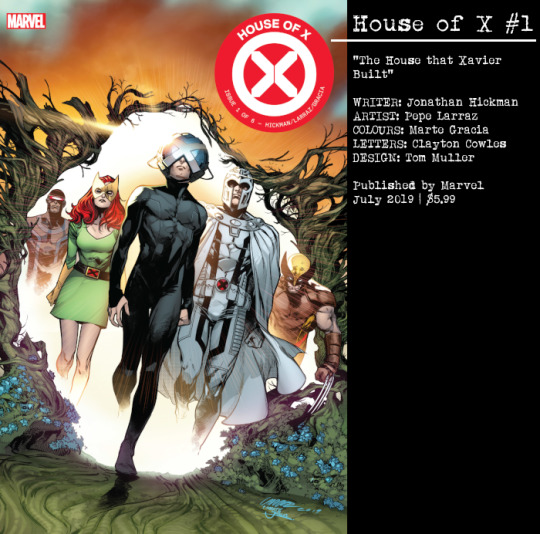
For the past few years, you could argue that the X-Men franchise has been working on trying to rediscover its identity. Since reality reasserted itself coming out of the Secret Wars event, they’ve been in a kind of flux. The initial relaunch set up the mutants in opposition to the ascendant Inhumans. When that was brought to a head, Marvel’s merry mutants then redefined themselves in part through nostalgic “back to basics”. In the past year and a bit, the mutants through a series of endings in “Disassembled” and Uncanny X-Men, while the Age of X-Man event traumatized them in a loveless utopia. It’s been an interesting ride.
You don’t really need to know any of that, or anything at all of recent or past history of the X-Men, in order to jump into House of X #1. This hits the reset button on the franchise and, while I expect that the past will inform some elements, it can largely be enjoyed coming in blind.
This is arguably the largest, most dramatic change to the X-Men since Grant Morrison, Frank Quitely, Tim Townsend, Brian Haberlin, and Comicraft took over back in New X-Men #114. Jonathan Hickman, Pepe Larraz, Marte Gracia, Clayton Cowles, and Tom Muller kick off a new era that is firmly built on a science fiction grounding. It frames the mutant identity in a new understanding and begins a new conflict with the rest of humanity as human governments and organizations react to the new status quo.
Without going into any details in this section, I can say that House of X #1 takes many of the common themes and elements of decades of X-Men stories and gives them a new spin, both familiar and strange at the same time. All of it is brought beautifully to life through astounding artwork from Larraz and Gracia, taking it to a completely different level. It’s brought together nicely through the design work of Muller, implementing a number of text pieces yielding further information, making it decidedly feel like a Hickman comic.
The digital edition on Comixology is also another instance of having “Director’s Cut” material, including Hickman’s redacted script for the issue, a wide array of the variant covers, and process pages of line art and coloured pages.
It’s a bold new era starting point for the X-Men and I’m excited to see what else is in store.
There will be spoilers below this image. If you do not want to be spoiled on House of X #1, do not read further.
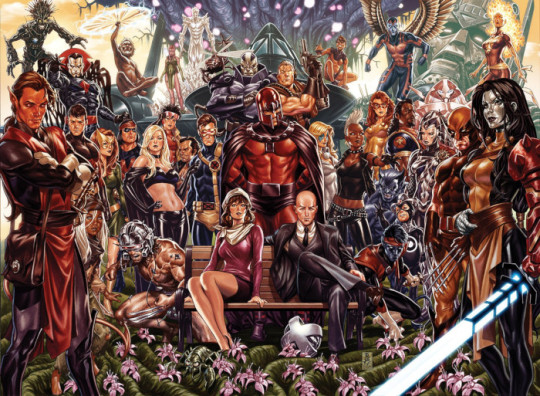
SPOILER WARNING: Below I’ll be discussing the events, themes, and possibility of what’s going on in House of X #1 and beyond. There are HEAVY SPOILERS beyond this point. If you haven’t read the issue yet and don’t want to be spoiled, please stop reading now. You’ve been warned.
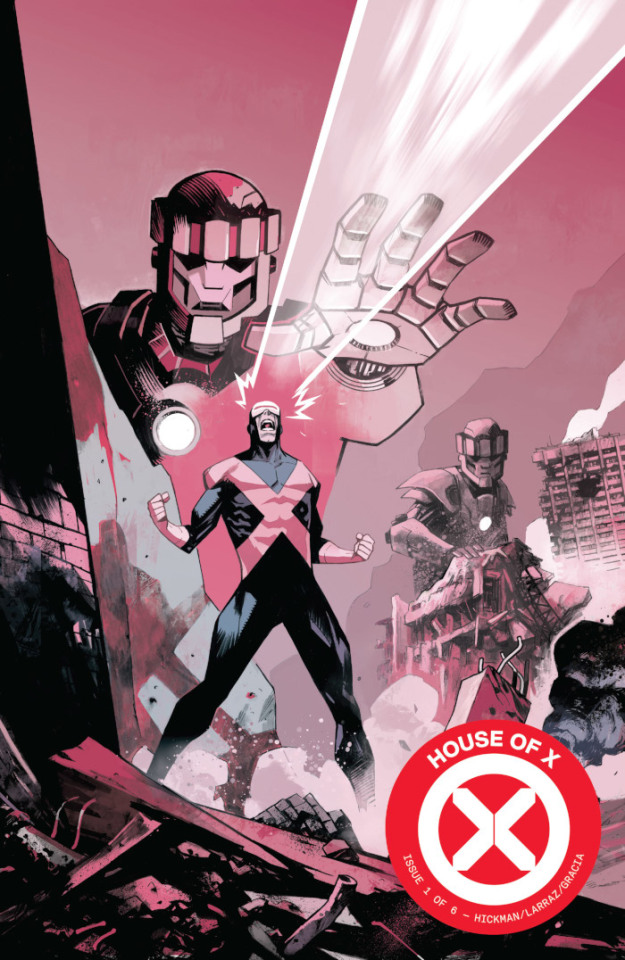
PREAMBLE | First Impressions
I had high expectations for House of X #1.
Jonathan Hickman is easily one of my favourite writers currently working in comics. He’s full of mad ideas that you look at and wonder why no one has implemented them in quite the same arrangement before. He’s great at execution and construction for the long game. While each story usually works on a micro individual story-arc/issue level, they also build a large tapestry that tells an even larger tale. One merely needs to look at his previous outing for Marvel telling one grand story that began in Dark Reign: Fantastic Four (with elements you could say were seeded even in Secret Warriors) and ended in Secret Wars. It was wonderful.
Pepe Larraz has been wowing me with his art since Uncanny Avengers. There’s a fluidity of motion and design that evokes the spirit of Alan Davis, Neal Adams, and Bryan Hitch, while adding what feels like an even more gargantuan attention to detail and sense of design. He elevated that even further with stellar showings on Avengers: No Surrender and Extermination. He’s easily become one of Marvel’s premiere artists to me.
When you combine Hickman and Larraz, and couple it with a marketing machine hyping this as the next big thing in the X-Men evolution, expectations were huge.
House of X #1 exceeded those expectations.
This first issue feels like a sea change for the X-Men, in terms of the team’s status quo and in the approach to storytelling. This is a science fiction story with heavy political leanings. With Xavier pushing the lead, Marvel’s mutants have staked a claim on a new mutant nation on Krakoa, with tendrils through Earth and beyond.
And it’s breathtaking. The artwork from Larraz and Marte Gracia is beautiful. The landscapes and vistas, the designs for the characters, the page layouts, and more, this is a visually stunning book. Larraz has truly outdone himself with the line art, but it’s taken even higher by the sheer beauty in Gracia’s colours. It’s very rich, emphasizing the beauty and wonder of this new world being birthed into existence.
There’s also an interesting choice here in Clayton Cowles’ letters, it’s mixed case. These days it’s not necessarily as unusual not to be in ALL CAPS, but it is different from what we’ve seen in Uncanny X-Men as of late and helps to foster that idea of this being something different. Similarly the text pages scattered throughout from Hickman and Muller that give this the stylistic feel of a Hickman comic and enriches the depth of this new world with more information.
ONE | X Nation
The idea of a mutant nation isn’t a new one. Magneto broached it before and attempted a kind of compound with Asteroid M. Genosha was set up as a mutant paradise for a while. The fallen remnants of Asteroid M served as the X-Men’s home repurposed as Utopia. A corner of Limbo was briefly carved out as a haven for mutants. There was that enclave with Xorn. And Jean Grey kind of set up mutantkind as an amorphous nation within nations given central home in Atlantis during X-Men Red.
More often than not the nation merely serves as a backdrop for the X-Men’s interactions in the rest of the world. I mean, when mutants had their own homeland in Utopia, more stories took place in San Francisco even before the schism that drove half of them off to the Jean Grey School of Higher Learning in New York.
What’s presented in House of X #1 feels different.

Ostensibly, the new mutant nation is headquartered on Krakoa itself, but the implication is that it’s so much broader. The X-Men have seeded Krakoa flowers all over the Earth, on the Moon, and Mars and have grown what feel like embassies and external outposts of the fledgling mutant nation. And it’s the fact that these outposts are within other nations, with the potential of moving a superpowered army unseen and seemingly instantaneously, that has the government representatives met this issue nervous.
While it is a home and a haven for mutantkind, it’s also actively being treated as a political entity. Similar to how Jean argued her case for mutantkind in X-Men: Red, we’ve got ambassadors of sorts checking in with Magneto and two of the Stepford Cuckoos. There are some intrigue elements that sync up with other aspects of the story, but the fact that it’s being used as a tour, a show of force, and an ultimate in order to broker a deal recognizing Krakoa as a nation is an interesting development. It takes it from a place of superheroes playacting at being politicians to actually being politicians. Abrupt as it may be to have Magneto as the face of the operation.

But that’s part of the genius of this play. Like with Magneto siding with Scott upon the founding of Utopia, Xavier and Krakoa is a further fulfillment of Magneto’s dream. A mutant homeland with mutants in control. Every previous time this has happened it’s come to ruin, but it’s always fun while it lasts.
Also, it’s an impressive show of power to have Magneto as the liaison to the rest of humanity. Where Kitty Pryde or Jean Grey would likely be more diplomatic, that isn’t the intent here. Sending out not only one of the most powerful mutants as your face, but also someone who has been in direct conflict with humanity over the years, pushing a mutant independence angle, is a statement that the new mutant nation isn’t something to be trifled with.
TWO | Who are these X-Men?
With the release of titles, creative teams, and team line-ups for the forthcoming “Dawn of X” reboot following House of X and Powers of X, there have been a lot of questions about what’s going on. Characters who have died during recent issues of Uncanny X-Men are alive and well. Characters who were in different configurations and statuses seem to have been changed to more familiar versions and attitudes. So it raises the question for House of X, who are these X-Men?
This first issue doesn’t answer that. I don’t know if we’re going to get an explicit answer that, but I think we’re given a clue on the very first page.
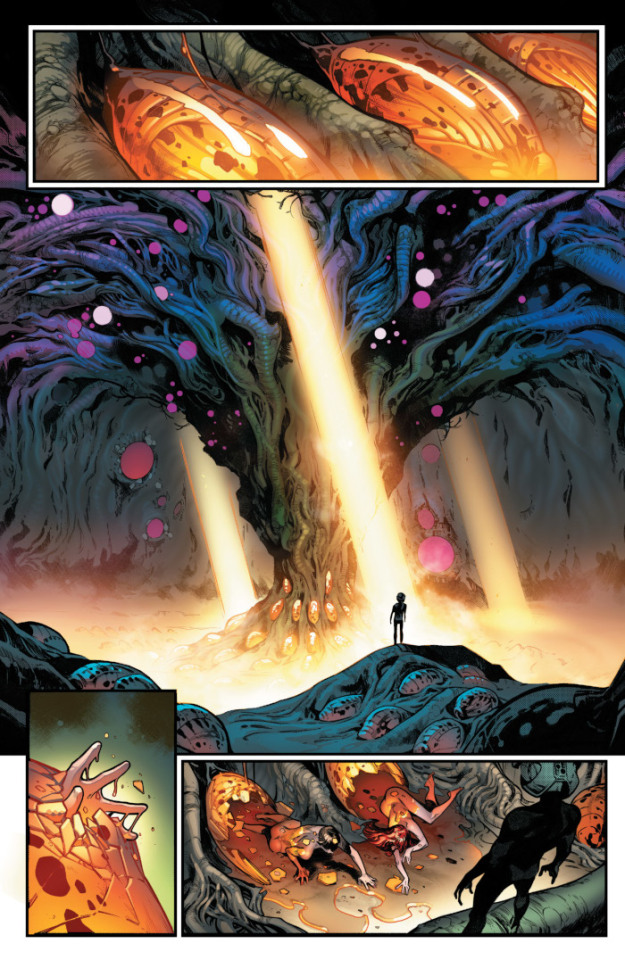
A key element in this first issue is the utilization of the mutant island Krakoa, both as a new home for the X-Men and as refined and adapted through application as portals, habitats, and medications. But in the opening scene, we see a central tree essentially acting as a birthing matrix overseen by Xavier.
The first born being Jean and Scott, I’d guess, then maybe that’s Bobby on the second page with some others. It’s possible that the one guy is even Gabriel Summers. It could be that they’re being rejuvenated, refreshed, and refined through healing properties heretofore unrevealed of Krakoa, but it may be more sinister. There’s a reaching, a yearning towards Xavier that makes me suspect. Are they the characters that we know? Or are they something else? I don’t even know if that’s a question we’re supposed to be asking.

Other than Magneto working front and centre with the team, they’re also working with a number of other traditional villains/antagonists like Sabretooth, Mystique, and Toad. All three have had their dalliances back and forth between the sides of good and evil, but it’s interesting to see them in the fold here. One the one hand, it reinforces the idea that this initiative of Xavier’s is for all mutants and that they’ve come together. But it also raises the question further, how?
I think it’s worth noting that every X-Men character we see fully interacting in the real world has been a villain at one point. Cyclops included, since the last time the world at large saw him before his resurrection he was “Mutant Terrorist Most Wanted #1″.
With characters seemingly back from the dead, characters changed to different versions, characters rejuvenated and healed as it appears that both Cyclops and Banshee are, characters who’ve previously been at one another’s throats, there’s a lingering doubt of how Xavier achieved this. There’s also a happy Wolverine playing with kids, so just think on that for a bit.
THREE | Master of Puppets

Professor Charles Xavier died (again, but who’s keeping track?) during Avengers vs. X-Men back in 2012. Then was brought back in Astonishing X-Men, first as a disembodied psyche caught in the Shadow King’s web and then through the personality sacrifice of Fantomex, inhabiting his body. He referred to himself as “X”, as something new, despite repeatedly claiming that he is the one, true Charles Xavier. His actions, both in his initial appearances and in the subsequent Astonishing X-Men Annual wherein he reunited with the remaining original five X-Men (Cyclops was dead at this point), could be considered manipulative, possibly even evil, callous, and villainous. We’ve not seen him again until now.
With the uncertainty of the origins of the wide cast of characters on the team, whether or not they really are our X-Men we know and love, doubt is cast on Charles Xavier as well. And it’s not just because we only see part of his face. Larraz’s design for Xavier’s new large, portable Cerebro deliberately distances us from him. It’s alien and off-putting, and I believe that’s the idea. I’m unsure whether or not this was the intention, but it also evokes the memory of another villain that Hickman enjoyed using, The Maker. The visual similarities and implication of another hero turned villain can’t be missed.
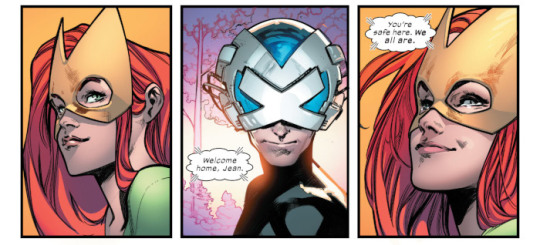
Consistent with that idea is the portrayal of Jean here. From a real life perspective, there’s an argument that all of the X-Men in House of X and beyond are taking on the costumes and behaviours of their most popular incarnations. In that regard, it would kind of make more sense that Jean would be in a more Phoenix-inspired get up or something similar to her blue and yellow outfit from the ‘90s.
Instead, we get Marvel Girl. Which seems odd to me. It’s not only regressive, but it represents a time period that in-canon Jean supposedly hates. It was, however, a time where Xavier’s somewhat lustful intentions towards his student were more apparent (creepy and disturbing as they are). It further reinforces that maybe not everything is on the level with what’s going on.
FOUR | A New Religion

Religious symbolism and outright textual substance are rife throughout this issue. From the beginning of Xavier acting as a kind of god to the newly reborn mutants beneath a Tree of Life through to Magneto’s proclamation at the end of the story, this first issue is planting the seeds of a new mythology for mutantkind. It’s something that sets them apart from the rest of the superheroes on Earth, giving them an explicit framing as the overseers of the world, but with it, there’s a tie back to how this new nation feels different.
There’s a definitive feeling from House of X #1 of building an entire society. Religion as an aspect of that, both real and implied, but we also get a new language of Krakoan (the glyphs we’ve seen before and again in this issue) and the idea of a broader organizational structure to Krakoa. It’s not just a school any more.
FIVE | Dangerous Beauty
There’s an interesting dichotomy set up in this first issue as well between the mutants and humanity. Of nature versus technology. It’s one we’ve seen before in mutants being the natural evolution of mankind coming into conflict with the sentinels constructed in order to prolong mankind’s grip on power. It tends to lead to the kind of nightmare scenarios of post-apocalyptic futures as we see in Days of Future Past.
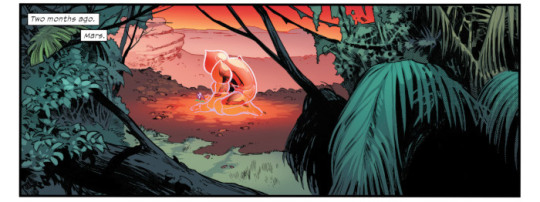
Krakoa is an inspired choice for the catalyst of mutant change in the world, delving into some of what was explored in Wolverine and the X-Men, but going steps even further. Creating pharmaceuticals, creating properties similar to Man-Thing’s ability to transport throughout the world, and the various habitats. It’s like the Weapon Plus application of The World in that everything is grown, organic, nature-based objects all ostensibly pieces of the greater Krakoa entity. I wonder if this gives Xavier and the X-Men effective “eyes” all over the world?
It’s also important to recall how dangerous Krakoa has been throughout X-Men history, acting as an antagonist that kickstarted the all-new, all-different era in Giant Size X-Men #1, built out even in Deadly Genesis with the lost team, and the problems had at the Jean Grey School with the baby Krakoa.
And then there’s the flip side.
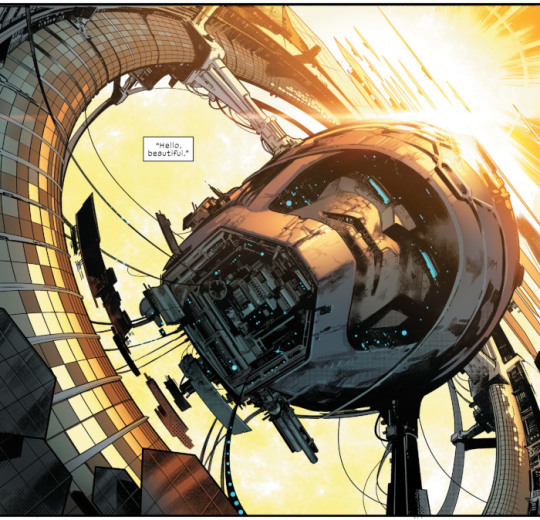
Orchis is a new organization introduced here comprised of a number of former agents of Marvel’s intelligence community, good and bad, ranging from SHIELD to AIM. And we’re brought aboard the Forge. There’s a fearful symmetry to it, a station close to the Sun building machines to counteract whatever it is that Xavier is ultimately doing. At the Forge’s heart what appears to be a new kind of Master Mold sentinel, decked out in some of the same colour schemes that we recently saw with the golden sentinels of ONE in Uncanny X-Men.
I can only imagine that this is going to wind up well.
We’re shown a face that we’ve not seen for a while (outside of solicitation covers), since I thought she was an “ordinary” human again, in Karima Shapandar. It’s kind of sad, though, as her Omega Sentinel protocols seem to have been reactivated.
SIX | We Can Be Heroes
The presence of the X-Men within the broader Marvel Universe framework can be problematic at times. It’s one of the reasons why they’ve often been shuffled off to parts unknown, set up as a rag tag band of fugitives, and limited in number to the point where they’re culturally, socially, and politically insignificant. Because the heart of mutant existence within the Marvel Universe is one of intolerance.
Mutants are feared and hated, hunted down, enslaved, or executed. While it works extremely well as an analogy for real life racial and sexual bigotry and prejudices, it takes on a different level of problem in the face of a world filled with superheroes. For superpowered people who aren’t mutants, you wonder about a couple of things, such as why the general populace even makes a difference and why non-mutant heroes don’t seem to care about mutant prejudice.
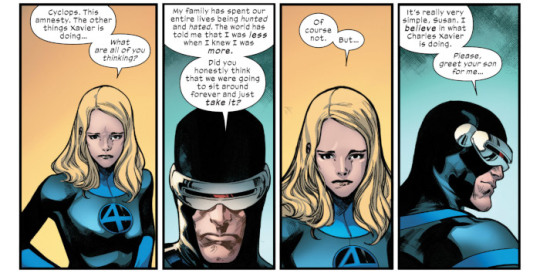
That latter one has been approached a few times previously, as recently as this latest volume of Uncanny X-Men, and it always seems strange. It’s like the question that you see raised in Swamp Thing and Marvelman and later The Authority of the realistic application of near limitless god-like powers as a force for change; if you’ve got these powers, why don’t you do something to change the world’s ills?
It really undercuts the heroism of teams like the Avengers and the Fantastic Four, because it eliminates them as defenders of a universal justice, but merely teams that fight for the status quo. And so eventually the X-Men get shuffled off to Chandilar.
I think it’s great that House of X #1 goes straight for that jugular. Cyclops’ confrontation with the Fantastic Four beautifully displays his integration and friendliness towards the other heroes, that he’s happy for Ben’s wedding, but still at odds with them when it comes to overall mutant rights. Including those of Sabretooth, who admittedly just robbed a place and probably killed a few dozen people. So, it’s not like the Fantastic Four are in the wrong in trying to apprehend Sabretooth, but it’s reinforcing bits of the laws of the state versus possible ethical or moral concerns.
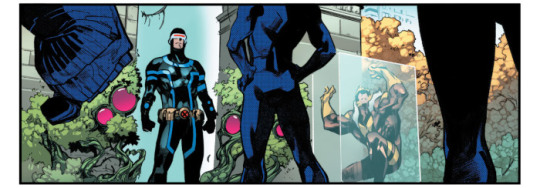
This scene also reminds us that mutants are everywhere. They can be anyone within society, anyone’s husband, wife, mother, father, friend, daughter, family, neighbour...anyone’s son, including Franklin Richards, son to Reed and Sue. It helps underline that compassion, understanding, and fighting for what’s morally right is something that really should be at the forefront here. And that Cyclops and the rest of Xavier’s new nation of Krakoa are making it known that they’re not going to accept the intolerance any more.
It’s also interesting the incorporation of the broader Marvel Universe as a catalyst for this confrontation in that Sabretooth, Mystique, and Toad were stealing information from Damage Control. It’s a neat bit of the shared universe and presents something potentially nefarious about Damage Control appropriating broken Stark and Richards tech. Though, we are left wondering, what did they steal?
SEVEN | Nothing As It Seems
One of the central themes we’re presented with in the ambassadors’ tour through Krakoa as led by Magneto is that nothing is quite as it seems. It’s even mentioned explicitly through the dialogue when the ambassadors are discussing the deal as lain out by Xavier. Worrying about the drugs, but even more about the amnesty. The terms of the amnesty aren’t actually stated here, but the gist seems to be that all mutants, criminal or otherwise, need to be set free (and presumably allowed passage to one of the gateways to Krakoa), if the country is to take part in the life-saving drug aspect.
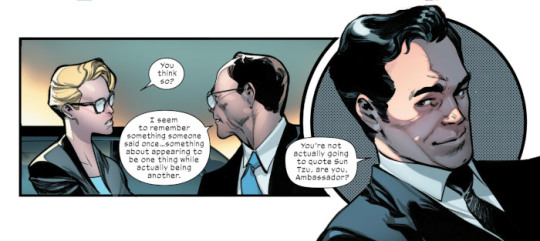
Now, there’s an in-story payoff to the ambassadors statement, in that they’re all plants of one form or another, working for different organizations in order to gain information or surveillance on one thing or another and in Magneto’s ulterior motive for gathering them, but it feeds back into that tingling suspicion from the first page.
Something feels off. Something feels wrong. But that could well be the point. The seeds of doubt may well be planted intentionally for Xavier’s plan and the appearances of the characters. It could well be that we’re supposed to think that something hinky is going on, just to keep us in suspense. And that everything we’re seeing, everything we’re being told, really is the truth.
CONCLUSION | A More Perfect Union
As I said previously, House of X #1 exceeded my expectations.
Hickman, Larraz, Gracia, Cowles, and Muller came together to produce what is one of the most exciting and intriguing first issues that I’ve read in a very long time. Every single element from dialogue to line art, colour to letters, to cover to design gels into one massive stroke of storytelling. Every single thing within the comic adds another layer to immerse yourself into this brave new world of mutant merriment.
This is an incredible start to this new era and I am very excited to see what comes next week in Powers of X #1. Especially in how it relates back to House of X #1. These issues are apparently meant to be paired, but how exactly remains to be seen. I find that interesting, since PoX is apparently set in a different time frame.

d. emerson eddy is not an island.
14 notes
·
View notes
Text
Deadly Class Vol. 1
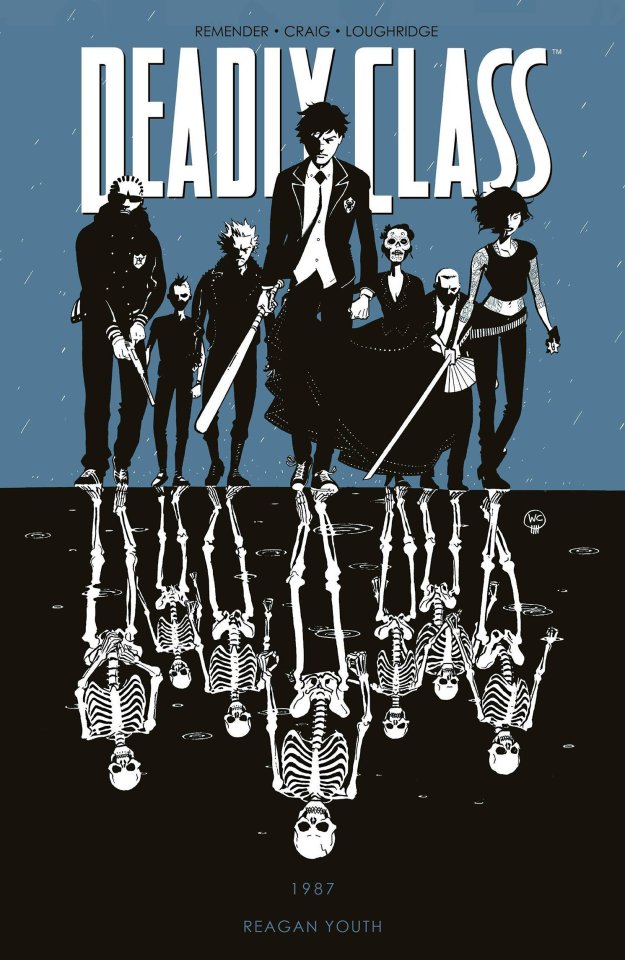
Deadly Class vol 1 collects issues 1 through 6 of the ongoing comic series, written by Rick Remender and drawn by Wes Craig. The series follows Marcus, a 14 (?) year old boy who is living on the streets, after his parents are murdered right in front of him. One day he accidentally ends up crashing a police stick-up and gets invited to join the King’s Dominion School for the Deadly Arts; a school that trains professional assassins.
I don’t even know where to begin with this series; I guess the best way to go about it, would be to talk about vol 1. Vol 1 introduces us to Marcus, as well as a handful of supporting characters, most of which are other students in the school. The school itself is centuries old; the people who go there are all children or relatives of gangs, cartels, yakuza, FBI/CIA/KGB agents, mafia or just serial killers. Marcus himself is the son of a Nicaraguan double agent, but having spent the past 2 years living alone, his reputation is not one that brings him a lot of friends, and Marcus himself is a difficult character to like.
I think that’s a good way to talk about this series too; it’s not easy to like. I usually reserve judgement for the end of my reviews, but I do have to warn you; this is an R rated comic. Don’t let the age of the protagonists fool you; this is a series full of blood, gore, drug abuse, murder, rape, pedophilia, animal cruelty and basically any other trigger you can think of. It’s a series that operates on shock value, in the sense that all the characters are thoroughly unlikable, they have horrible things happen to them and do horrible things to each other, and most of them are rather pretentious, annoying, and act very much like teenagers would, if they were stuck in that kind of situation.
The series is set in the 80’s, during Ronald Reagan’s presidency. This is an important detail, because Marcus’ motivation for joining the school (other than romance) has to do with Reagan specifically, as he is indirectly implicated in his parents’ death. The whole plot point about Marcus’ parents’ death is so crazy that even if I told it to you, you wouldn’t believe me, so I’ll just let you read it.
The 80’s setting is honestly one of the best parts of the series; there’s a lot of talk about politics, homelessness caused by the Reagan administration, veteran rights, and of course, lots and lots of drugs. The entirety of issues 5 and 6 have to do with Marcus tripping on acid, and the way Craig draws and captures the feeling of being on acid is probably one of the best depictions I’ve seen in media, save perhaps Enter the Void. I am so curious to see how they do that in the show.
There’s also a lot of talk about music; of course special snowflake Marcus listens to the Smiths (look I can say it, I too love the Smiths), but obviously there’s also talk of some early rap like LL Cool J and Public Enemy (wow I’m old). That whole conversation between Willie and Marcus is actually really interesting, because it serves as a bigger discussion rather than just music; it’s about the ways in which you want to be perceived, about bravery vs posing, and what is and isn’t allowed for ‘tough men’ to like. I could have definitely lived without the word ‘fag’ and “pussy” being thrown around all over the place, but I suppose that too is authentic to the time period and the way teenage boys talk.
Actually, the only thing I can say about the setting that didn’t mesh, is the dialogue. Marcus and the others talk like teenagers talk today; if I just read their lines, and had no idea this series was a period piece, I’m not sure I would’ve known it is set in the 80’s. What helps, is that all the characters sound authentic; they are written like teenagers, both in the way they speak and in the actions they take; they want to be cool, and mature, and smart, and Remender has a good grasp on all of their voices.
The plot of vol 1 is fast, action packed, and entirely batshit. There were several scenes which I found very effective; the scene with Marcus and the homeless man in issue 2, will probably haunt my nightmares; it’s such a good scene, and it makes Marcus probably the most unlikable and yet sympathetic lead character I’ve ever read. The fight between Marcus and Chico was also great, though I think it goes on for too long, and by the end of it, I was genuinely shocked that Marcus was able to survive, much less move after that much bodily harm. There are chase sequences that are amazing, the art helps make everything so much more engaging and fast paced; I was flipping pages, on the edge of my seat wondering what would happen next.
The actual story, is a bit muddled and unfocused; issue 1 is Marcus’ life before the school and how he got there, issue 2 is him making friends with some of the other students, issue 3 has him and Willie try and complete an assignment that goes wrong, and issues 4, 5, and 6, have the gang go to Vegas to kill someone, while also tripping on acid and getting chased by Chico. There isn’t really enough time to take in everything, and while I think the book actually does a great job at balancing the action with the character stuff the ending of issue 6 does leave a lot to be desired.
Let’s talk about the characters. First we have the two girls, Saya and Maria. Saya is the typical cold, (dare I say tsundere) love interest; she’s a yakuza, has a troubled past and is the reason Marcus decides to join the school. I don’t have much to say about her; I found her pretty bland.
Maria was a bit better, in that she has more of a personality. I didn’t like that she was shown to be both manipulative and kind of air-headed, and that her friendship with Saya was that superficial (though again, I suppose that is authentic to how some teenage girls are like). Her confrontation with Chico did illuminate at least a bit of why she’s acting the way she is, but I am really not looking forward to Marcus-Maria-Saya love triangle.
Chico was… a mess. He’s part of a cartel family, is jealous, violent, constantly angry and more than a little crazy. I kind of hated that he got settled with that role, mostly because he’s completely irredeemable. On the one hand I understand why he was angry at Maria and why he tried to kill Marcus, but he kills more people in a single issue than any of the other characters in all the rest of the issues combined, and shows no nuance or remorse.
Billy’s a punk, who I actually liked; he has a subplot about his father that was interesting, though like most things in this series, it’s very over the top graphic, and very on the nose with the storytelling. Billy being a crass character was fine, but the conclusion between him and his dad would have worked better if it wasn’t so dramatic.
Willie I liked the most. Unlike Chico who is just a stereotype of the angry, Mexican kid in a gang, Willie is a subversion of the stereotype about a black kid in a gang. He puts a lot of stock in appearance and reputation, because he has to maintain it, since he’s not actually capable of doing the things everyone thinks he can. I liked his friendship with Marcus, and I’m curious to see what Remender does with him in later volumes.
I have to mention “Marcus’ Mortal Enemy”; he was just such an insane character that I couldn’t believe what I was reading. The fact that he goes around calling himself Marcus’ Mortal Enemy, and ‘a sadistic redneck who fucks sheep’ is on a whole other level of tell don’t show (on second thought, please don’t show us this Craig, I beg you). He comes out of nowhere, even though he’s teased here and there throughout the volume, and I’m just so confused as to why he bothered to go to Las Vegas, to then NOT confront Marcus.
Speaking of, let’s talk about Marcus. Rarely do I come across such a well-developed and interesting, while at the same time completely unlikable character. Marcus has had a hard life; it’s clear that he’s been through hell by the time he gets to the school, and he has a whole host of problems. He overthinks, he’s anxious, he doesn’t know how to communicate with people, but he’s also incredibly pretentious, and is one of those teens who think they are the smartest and have the whole world figured out. Lot’s of his dialogue reminded me of the dialogue in Trainspotting; fitting since tonally, both are very similar and deal with similar themes. Marcus wants to be liked, is afraid of being left alone, and so he compensates with ridiculous and bad decisions. I hated his ‘romance’ with Saya, though it is in line with his character, and throughout volume 1 he does some genuinely reprehensible and irredeemable shit. I want to know where his character will go from here; even if I don’t necessarily like it.
If you don’t mind over the top violence, drug abuse and just the most horrible things humans do to each other, than this is the series for you. It’s brutal, it’s fast paced, the plot is ridiculous, and it has some very interesting things to say about a lot of topics. You just have to get through a lot of trash to get to the good stuff.
goodreads
6 notes
·
View notes
Text
Glass Review
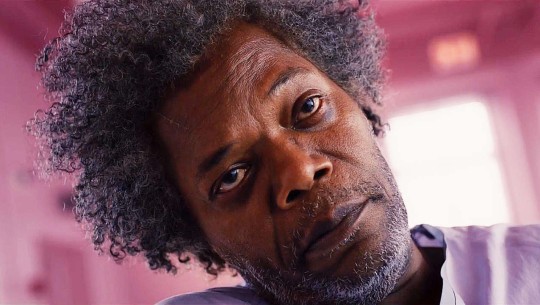
...or, 'The People v. M. Night Shyamalan.'
I finally managed to get out to see Glass. I'm going to do something a little different with this one, so bear with me. SPOILER ALERT: I will discuss the movie's contents openly in this review. You have been warned.
The Charges:
After The Sixth Sense and Unbreakable, the defendant was revered throughout Hollywood. His career seemed to be getting off to a promising start, and one magazine even heralded him as 'the next Spielberg.' Then audiences were underwhelmed by Signs and The Village, and distressed by The Lady in the Water, The Happening, and The Last Airbender. The defendant's career took a sharp downturn, and many came to hate him as a filmmaker and avoid his films. The defendant's name became an audience turnoff, rather than a draw. As the defendant's career went on, films like The Visit and Split engaged audiences and began to alter their perceptions of him. Then the defendant announced his development of Glass. A sequel to both Unbreakable and Split, two of his more popular films, and coming at an upturn in his career, it is clear that Glass will be the final trial of the defendant, M. Night Shyamalan. This film is the culmination of the argument of whether or not the defendant is a good filmmaker.
Past Evidence:
The prosecution brings to the court's attention the films The Lady in the Water, The Happening, The Last Airbender, and After Earth. These films are all poorly received by critics and audiences, and have disappointed many people over the years. The prosecution also draws attention to the underwhelming twists in The Village and Signs, which also disappointed audiences by not being as brilliant or monumental as they were hoping for.
The defense offers the films The Sixth Sense, Unbreakable, The Visit, and Split. The first two are brilliant films, beloved by critics and audiences for many years. The latter two have represented an improvement in the defendant's career, as he steered away from the 'gotcha' twist approach to filmmaking and made good, straightforward films in the horror and thriller genres. The defense also points to the great crafting of atmosphere in Signs, also seen in the defendant's other thrillers and horror films.
The Defense's Opening Argument - Simple things I liked about Glass:
In Glass, M. Night Shyamalan has made a film that he wants to make. He financed it personally, and it is a wholly director-driven film from beginning to end. It is very clear as one watches that Shyamalan has made a film that conforms to the vision he had for it. Glass unfolds just as Shyamalan wants it to, and every decision that was made was the decision that Shyamalan intended to make. The argument cannot reasonably be made that he does not recognize what he is doing with his film. He knows exactly what he is doing with it, and he has done with it exactly what he believed was best for the film.
The cinematography is gorgeous, and it works perfectly with Shyamalan's intentions. The fancy camerawork and occasional dutch angles are wonderfully artistic, and they actually serve a purpose unlike many other films nowadays. Sweeping pans and tilted cameras are often used just for the sake of using them in modern films; in contrast, Shyamalan knows what these things will accomplish, and he uses them to great effect. As in many of his other films, Shyamalan also uses color in a very striking manner. From the monochrome, faded tones of Dr. Staple and the mental hospital to the bold, varied colors of the main characters, the film's use of color is at least beautiful, even if it isn't as brilliant as it was in The Sixth Sense and Unbreakable.
The last simple thing that really worked for me, although it may have ultimately been contrary to the film's goals, was the strong connection with Unbreakable, one of my favorite movies. West Dylan Thordson's score employs several themes from Unbreakable's music, composed by James Newton Howard. The use of many of the same actors who played characters in Unbreakable, too, helped ground the film in that world, especially Spencer Treat Clark as Joseph. It was also remarkable how well Shyamalan incorporated several deleted scenes from Unbreakable, never before seen by the general public. These felt like a seamless part of the film, as did the perfectly cut transition from Kevin's father on the train to the original opening sequence of Unbreakable. All of these choices help the film to feel like an authentic extension of what came before, and this really improved my enjoyment of Glass considerably as I watched it.
The Prosecution's Opening Argument - Simple things I disliked about Glass:
Glass is not a perfect film. There are a few things that I felt didn't work quite like Shyamalan wanted them to. The first is the pacing. There are some major pacing issues with the film in the second act, and there are some elements that Shyamalan spends too much time on. I got tired, for example, of cycling through Kevin Crumb's different personalities in scene after scene. Don't get me wrong: watching James McAvoy do his thing is remarkably entertaining, but it gets old when the same scene occurs over and over and the same information is delivered by Kevin's different personalities.
Another flaw was in the use, or lack thereof, of the film's secondary characters - Casey, Joseph, and Mrs. Price. While the actors do a great job, and it's especially fun to watch Spencer Treat Clark do an equally great job now as he did 19 years ago, they felt for most of the film like they weren't doing enough to justify the screen time they were taking up. I get that the audience needed to be reminded that these characters were important throughout the movie, but perhaps there were better ways to incorporate them so that they had more meaningful roles to play before the climax. Maybe Joseph could have planned a breakout, only to have his hopes dashed when his plan fails. Casey could have helped him, or interacted with a friend who helped her to make sense of the things that were going on in her mind. Mrs. Price is the only one who I feel was not underused, because her scenes with Elijah made sense and went places, without repeating themselves over and over.
Lastly, I would have liked some better set-up for the secret society of clover tattoos, or whatever we're calling them. I thought when I initially saw the first clover tattoo that I was supposed to recognize it from earlier in the film and I didn't remember having seen it. It seemed to come a bit out of left field, as well - I knew that Dr. Staple couldn't just have been a psychiatrist, but that's about all the justification we have for it from the rest of the movie.
Defense Witnesses - McAvoy, Willis, Jackson, Clark, and Taylor-Joy:
One thing M. Night Shyamalan is usually very good at is getting amazing performances from his actors, particularly young ones. In both Unbreakable and The Sixth Sense, the movies relied heavily on child performers, and Shyamalan was able to get incredible and moving portrayals from the children in each. Both Haley Joel Osment from The Sixth Sense and Spencer Treat Clark from Unbreakable went on to have reasonably successful careers, and remain good actors to this day. Even in today's Hollywood, with the practice of using young-looking actors in their twenties to play teenagers, Shyamalan has thrived on great performances from performers such as Anya Taylor-Joy as Casey Cooke.
But Shyamalan does not just get great work from children. The adults in his movies are often very skilled, and if they are, they bring all of their skill to the table for his films. Whether it's James McAvoy's stellar if overused performance as Kevin Crumb's 23 personalities, Samuel L. Jackson's appropriately unsettling turn as Mr. Glass, or Bruce Willis showing up and giving it his all for the first time in years, Shyamalan consistently utilizes all of the talent his actors have to offer.
The Prosecution Calls the Defendant to the Stand - M. Night's case against himself:
Even as filmmakers go, M. Night Shyamalan has had an enlarged sense of his own importance in the past - see also casting himself as a brilliant writer in The Lady in the Water. He is also not a subtle filmmaker - see also casting himself as a brilliant writer in The Lady in the Water. Both of these tendencies come into play in Glass. Shyamalan's intention for this film is to make it feel like a naturally progressing story, and yet also to make you think it's one film when it's really a completely different film the whole time. All this, and the audience is supposed to leave the film both feeling satisfied and feeling like they fell for something clever and well-constructed. In short, the audience needs to walk out of the theater believing that the filmmaker was intelligent and clever for tricking them in the way that he did. It's hard not to believe that this played into Shyamalan's ego a little bit. It's also understandable that he would want to feel this way again; after all, 'the next Spielberg' is high praise, and when people love the movies you've made as much as audiences loved The Sixth Sense and Unbreakable, it becomes hard not to get a big head about your own talent. But if audiences are underwhelmed by the twist or reversal, and they feel like it wasn't worth the fake out, it backfires by making people feel cheated instead of cleverly tricked.
The Jury Deliberates:
I'm conflicted about this film. It's very well planned out, and equally well executed. Each element is used towards Shyamalan's purpose for the film as a whole. My big question is whether or not I like that purpose. The ending is successful in that I was duly convinced I was watching one film and I was surprised when I discovered I was watching another. But did it please me or did it disappoint utterly? Lest you think I'm creating false suspense, I'm trying to figure out these questions for myself as I type these words. But I think now the jury has reached a verdict.
The Verdict:
As a film, I love Glass. It's a true Shyamalan-style movie, with a reversal (I don't think I'll call this one a twist) at the end that does successfully alter your perception of the film entirely. It's well-constructed, though not without its pacing issues, but the buildup felt right and worked for me. The movie is well-shot, well-scored, and well-acted, and all the craftsmanship present is incredible. And I think that if Unbreakable had not existed, that would have been enough to make me love the movie. Simply marketing it as a superhero epic from M. Night Shyamalan would've been enough to get me into the theater, and would also have put the expectation in my mind that the film was building to a classic superhero conclusion. In such a case, the twist would have satisfied me by giving me a different movie than I expected, and I would have loved it.
But as a sequel and a continuation of Unbreakable, I'm not quite so convinced. As I said before, Unbreakable is one of my favorite movies of all time. I think the best description of that film is 'the first act of a superhero movie,' and in that context I expected Glass to be the second and third acts. Instead I got a classic M. Night Shyamalan film, that's not what you expect it to be and tells an odd but clever story. As a film, that's what I want to see, but as a sequel to Unbreakable, it was a let-down. Because I love Unbreakable so much, I was hoping to see an epic continuation/conclusion to that story. That drew me in just like I was supposed to be drawn in, and it made the twist work to subvert my expectations just as Shyamalan intended. I didn't get the film I was expecting. That would be fine if the film I was expecting wasn't also the film I wanted. It would be fine if the film I was expecting wasn't the film I've wished could exist since the closing credits of Unbreakable first crossed my screen. It would be fine if the epic conclusion to an epic story that I was really excited to see wasn't broken and crushed, shot in the gut, and drowned in a puddle. As a film, Glass is amazing. But as a sequel, 19 years in the making, to a movie I love, it was disappointing and sad.
However, Glass has successfully proved to this court that the defendant has still got it, that he can still deliver a film that's as well made as the ones he used to make two decades ago. The jury finds the defendant not guilty.
I'm not going to rate this movie. I couldn't rate it in a way that I could completely get behind.
CoramDeo believes in the power of storytelling.
2 notes
·
View notes
Text
"Overused” is Overused: Understanding Clichés and Tropes in Your Writing
I hate writing advice.

That’s my little tongue-in-cheek joke for this post, because the irony of what I’m doing literally as I type that statement is not lost on me. It’s true, though— I honestly think that advice is one of the most damaging things to a writer’s mindset. It makes them second-guess their methods, their ideas, and even whether they truly have what it takes to be a *~*writer*~* in the eyes of the rest of the world.
It’s a truly unfortunate thing, because it’s so important for writers to be able to share their experiences and successes. The problem is that these experiences get passed around in a game of It’s-Been-Ten-Years-Since-This-Essay-Was-Written Telephone, and the original intent of the advice (and sometimes its actual meaning!) gets lost along the way. They become these overarching blanket statements that offer broad limitations without reason or potential alternatives.
One of the greatest offenders of this is the idea that you ought to avoid clichés in writing. I’ve been part of online writing communities for a while now, and by far the most common concern I see is some variant of, “I’m thinking about doing [x], but I’m worried it’s too cliché”. It’s an epidemic amongst writers, and it absolutely infuriates me that so many writers have come to doubt their own work just because some vague internet grapevine has told them that clichés are to be avoided at all costs.
Because I’m so infuriated by this (and because I’m super extra and actually have a relevant platform on which to discuss this), I’m going to take some time to explain the actual meaning of this particular piece of “advice” and why it’s far less of a concern than you’ve been lead to believe.
To begin, it’s very important to address the fact that there’s a fundamental misunderstanding surrounding this idea. This starts with the fact that the terms cliché and trope are mistakenly thought to be synonymous, or otherwise become confused with one another. Before I move forward, I want to offer the proper definition for both.

A cliché is a particular phrase that’s been used often enough to become commonplace. In writing, they’re generally used to create a specific image or tone that we can take for granted that the reader will recognize.
She was the most beautiful girl I’d ever seen. It was raining cats and dogs, but she still stood with her arms to the sky, laughing like she didn’t even notice. She turned to me and winked, and I felt my face go as red as a beet. In that moment, I knew that I’d give my right arm to be with her.
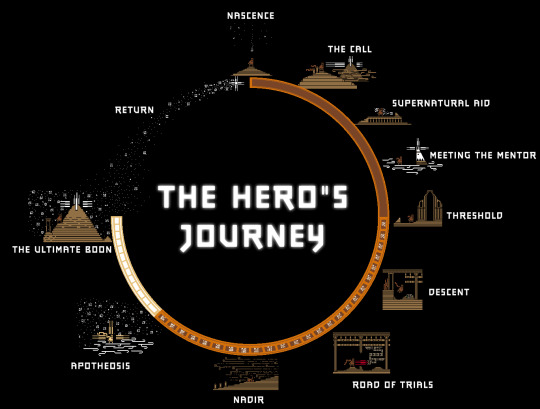
A trope is a convention used in writing to give meaning to aspects of your story. They’re used as storytelling shorthand to attach identifiable qualities to your plot and characters— recurring themes that exist throughout history to guide stories.
Examples of tropes include the hero’s journey, the character’s fatal flaw, the comic relief character, the hero with a dark past, and the Mom Friend.
I’ll be the first to admit that there are similarities between the two— both are used to help readers understand parts of your story, and tropes can be specific phrases as shown in the cliché example above. The key is to separate the two in your mind and think about them only by the definitions above.
It’s important to do this, because part of the central misunderstanding is that “cliché” is often used in daily life to describe ideas as a whole that have been overused (think of the “I’m holding up the tower!” pic that literally everyone takes at the Leaning Tower of Pisa). I get the confusion and concern here, I really do. The most important thing to remember is that clichés have a specific meaning when it comes to writing. No matter how often you may see a particular theme or character arc, it is and always will be a trope.

With that out of the way, I’d like to discuss why this should be good advice. The truth of the matter is that clichés should be avoided where possible because they give the impression of lazy writing. Writers and readers alike take the imagery for granted and rely on these tried-and-true phrases to add physicality to their prose instead of finding unique descriptors; while it certainly gets the point across, it comes across as more of a 2D picture from a magazine than a scene from the movie adaptation we all know our books are destined to have.
To illustrate this, let’s take a look at the example above with all of the clichés removed:
The world had never experienced a beauty like hers— neither had I. I just watched as she stood there, arms to the sky as the rain pelted her relentlessly, soaking into her clothes and hair. She smiled as it ran down her face, laughing at each raindrop, finally turning to me and winking. She could have just been blinking the water out of her eye, I don’t know, but my face was hot and I suddenly found it hard to look at her. I stared at my shoes, willing them to take a step for once so I could go and join her.
Clichés fall flat because they aren’t specific to you as a writer— they aren’t at all indicative of your unique style. Your story loses so much when it’s not told in your own voice, so you shouldn’t rely on old phrases just because you know people will automatically understand them.
While the argument could be made that tropes fall into this same category, I would point out that tropes serve a deeper purpose than clichés. Where a cliché would act as filler, a trope would act as a foundation. Tropes are tools (most frequently, structural tools) that guide the story through plot/character development and tonal themes to give your reader a general idea of what they’re signing up for when they read your story.
Example Time!
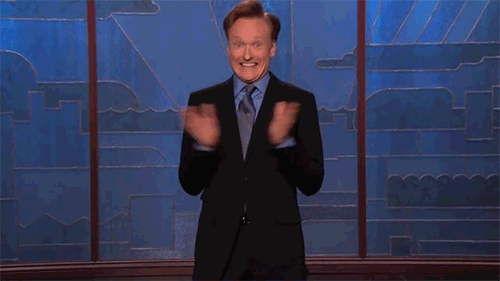
Say that you wanted to write someone a love poem. You do your research, sifting through decades of poems to pick out the best phrases and metaphors, and you end up with the following:
Your eyes are as deep as an oceans
Your eyes shine like stars
They’re like windows to your soul
I get lost in them every time I look
The poem is essentially a cut-and-paste of phrases from every cheesy romance novel out there, and will most likely leave the object of your affections wondering why you’re so obsessed with their eyeballs.
Alternatively, you hand them this:
Roses are red,
Violets are blue...
and things get a little more interesting. Sure, the opening to the poem is a cliché in and of itself, but it sets the stage for whatever you want to fill it with. You could go with something traditional and make it cutesy, you could subvert the trope by dropping the rhyme scheme for dramatic or comedic effect, you could even revive the old 2015 “gun” meme. The world is your oyster!
The point is, the poem hasn’t been written for you. Sure, it follows a similar structure to poems that have been written before, but where you take it is entirely up to you— the opening lines are simply the prompt to make way for your own creative license.
Let’s be real, here.
I get that everyone wants to make something new and exciting that comes entirely from their own imagination. It’s the dream! The idea that anything we write could potentially be sourced back to an existing piece is super aggravating, and you don’t have to tell me how discouraging it is to have something that you’re genuinely proud of suddenly fall flat because someone says, “Hasn’t the teen dystopia thing been done to death?” or “Didn’t Star Trek do an episode like this?” or “Penney, this is just a Star Trek fanfiction with the names changed to Dirk and Spork, please stop.”
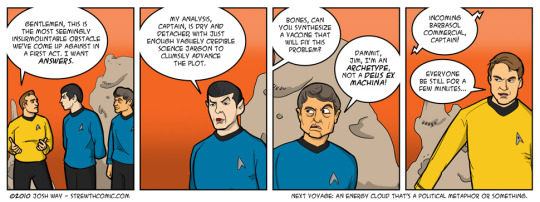
To be totally honest, there is not (nor will there ever be) a single piece of writing on this earth that’s 100% original. Everything is based off of a story that came before it, or had plots and characters that were cherry-picked from the millions of plots and characters that existed previously.
Even more honestly, people like it that way. Tropes help us to identify our favorite genres and characters, guide us to stories that we may like based on those preferences, and open our eyes to new stories and authors that follow those tropes in a slightly different way.
In short, embrace your tropes. Learn to recognize them and how they can be used and reimagined, and build your story out of the wonderful things that come of that knowledge. Be like me and waste a billion hours in the rabbit hole that is TV Tropes!
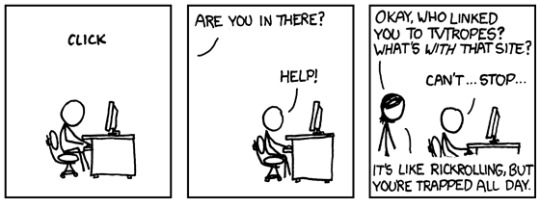
Most importantly, write the way you want to write and don’t let anyone else tell you how to do it. They’ll have their time when you’re ready for peer review. Right now is your time to do as you please, ignore all writing advice you see online, make a few mistakes, and do it all over again because that’s what writers do! Get out there and make some beautiful, cliché-ridden, trope-y masterpieces.
Love,
Penney
#ask p#cliche#cliches#tropes#literary tropes#tropes in literature#writing cliche#writing cliches#writing tropes#writing advice#writing tips
899 notes
·
View notes